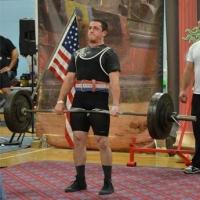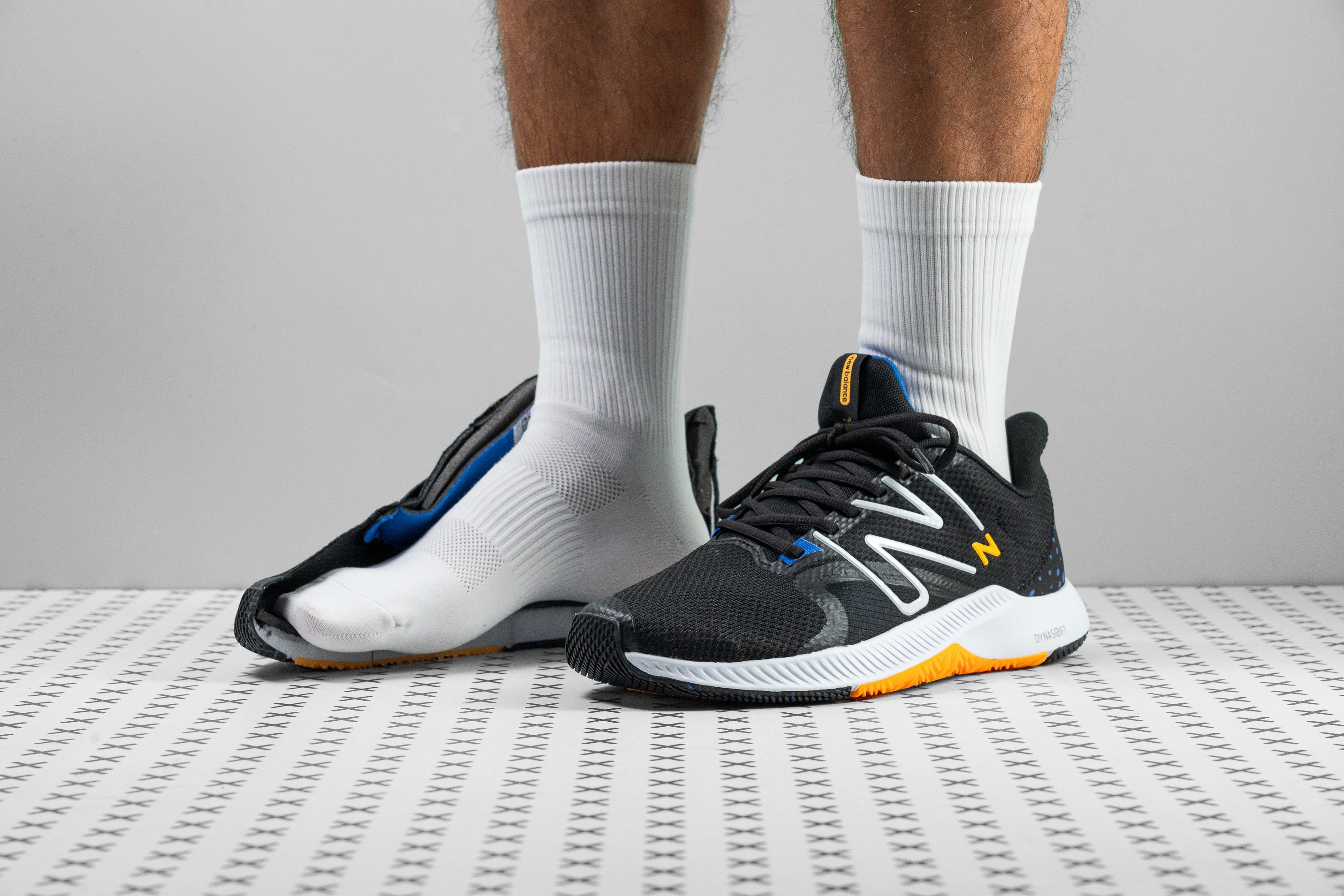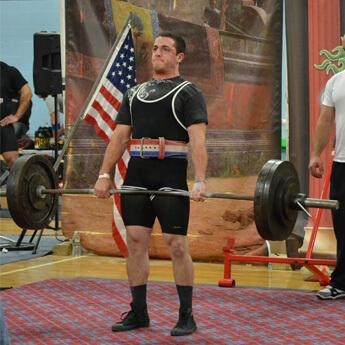Our verdict
Pros
- Highly breathable
- Lighter than average
- Wide and steady platform
- Hard-wearing outsole
- Solid grip on gym floors
- Comfortable in-shoe feel
- Can be worn casually
Cons
- Upper fabric tears easily
- Cheap and frail laces
Audience verdict
Comparison
The most similar training shoes compared
+ + Add a shoe | |||||
|---|---|---|---|---|---|
| Audience score | 60 Bad! | 83 Good! | 85 Good! | 87 Great! | |
| Price | £80 | £75 | £120 | £130 | |
| Use | WorkoutCross-trainingGymHIITSkipping ropeAll sports | WorkoutCross-trainingGymHIITSkipping rope | WorkoutCross-trainingGymHIITSkipping rope | CrossfitWorkoutCross-trainingGymHIITSkipping ropeAll sports | |
| Shock absorption | - | High | High | - | |
| Energy return | - | Moderate | Low | - | |
| Traction | - | Low | High | - | |
| Drop lab | 6.2 mm | 8.8 mm | 7.2 mm | 4.8 mm | |
| Heel stack lab | 26.9 mm | 30.6 mm | 22.0 mm | 22.3 mm | |
| Forefoot | 20.7 mm | 21.8 mm | 14.8 mm | 17.5 mm | |
| Weight lab | 10.2 oz / 289g | 10.4 oz / 296g | 9.7 oz / 274g | 12.3 oz / 350g | |
| Lightweight | ✓ | ✓ | ✓ | ✗ | |
| Breathability | Breathable | Breathable | Breathable | Moderate | |
| Width / fit | Medium | Wide | Medium | Narrow | |
| Toebox width | Medium | Medium | Medium | Medium | |
| Size | True to size | Slightly small | True to size | Slightly large | |
| Midsole softness | Balanced | Balanced | Balanced | Balanced | |
| Stiffness | Stiff | Stiff | Moderate | Stiff | |
| Torsional rigidity | Stiff | Stiff | Flexible | Stiff | |
| Heel counter stiffness | Moderate | Moderate | Moderate | Moderate | |
| Toebox durability | Bad | Bad | Decent | Good | |
| Heel padding durability | Bad | Bad | Good | Bad | |
| Outsole durability | Good | Decent | Good | Decent | |
| Midsole width - forefoot | Very wide | Wide | Average | Average | |
| Midsole width - heel | Wide | Wide | Wide | Average | |
| Widths available | NormalWideX-Wide | Normal | NormalWide | Normal | |
| Insole thickness | Average | Average | Average | Average | |
| Outsole thickness | Thick | Average | Average | Average | |
| Outsole hardness | Soft | Hard | Average | Average | |
| Heel tab | None | Finger loop | Finger loop | Finger loop | |
| Tongue: gusset type | None | None | Bootie | None | |
| Tongue padding | Average | Average | Average | Average | |
| Ranking | #37 Bottom 1% | #24 Bottom 35% | #21 Bottom 43% | #14 Top 38% | |
| Popularity | #35 Bottom 5% | #9 Top 25% | #2 Top 6% | #27 Bottom 27% |
Who should buy
We think that the New Balance DynaSoft TRNR 2 could be a great add-on to your gym wear if:
- you are new to working out and need an affordable pair
- you want a no-frills trainer for light-to-moderate exercise
- you prefer to have one pair of athletic shoes for both gym and casual use
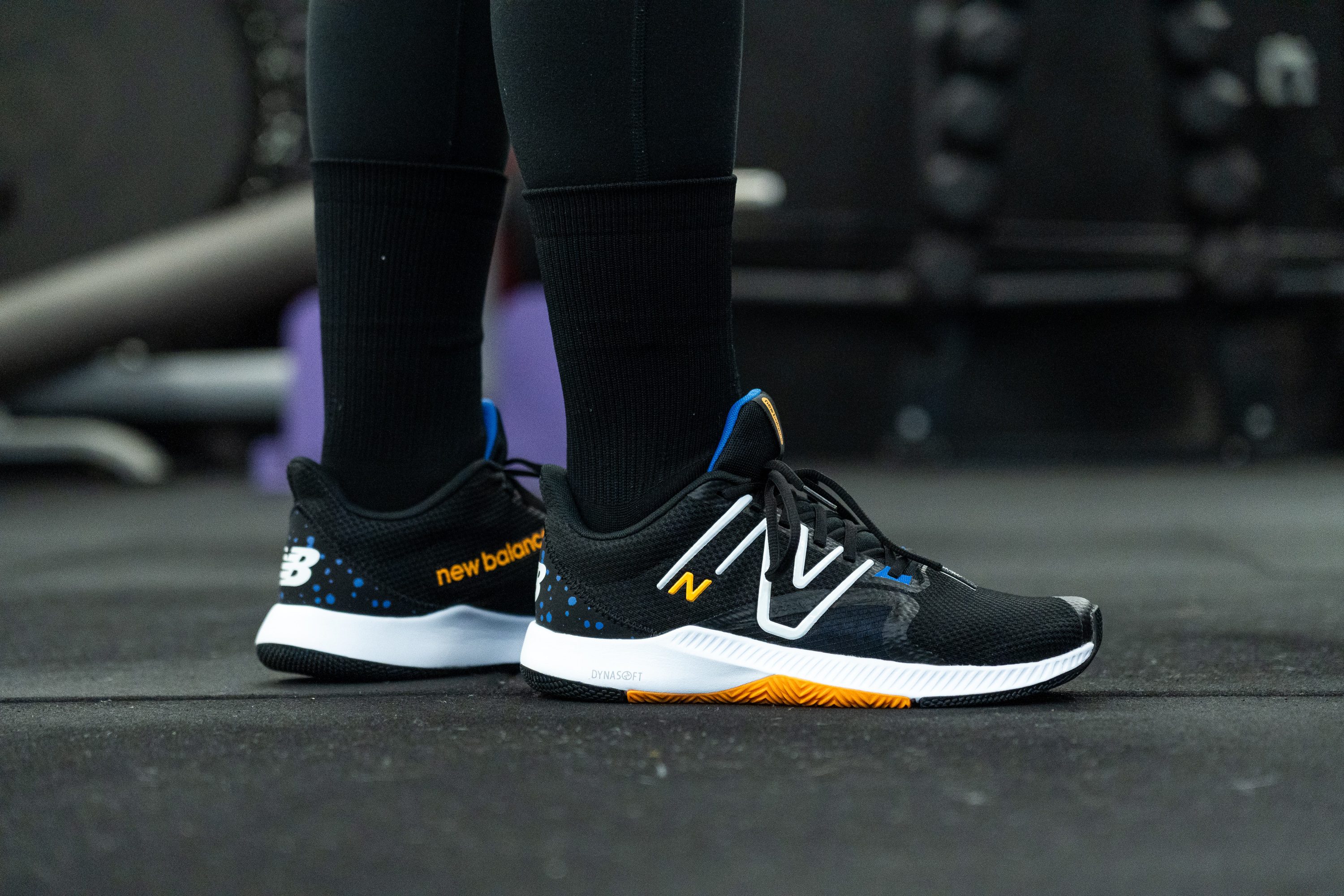
Who should NOT buy
If the shoe's dainty upper concerns you and you don't want to risk tearing it up, we recommend another affordable option, the Nike MC Trainer 2. It has a stronger toebox material.
Ladies might as well check out the women's Nike Air Max Bella TR 5 cross-trainer.
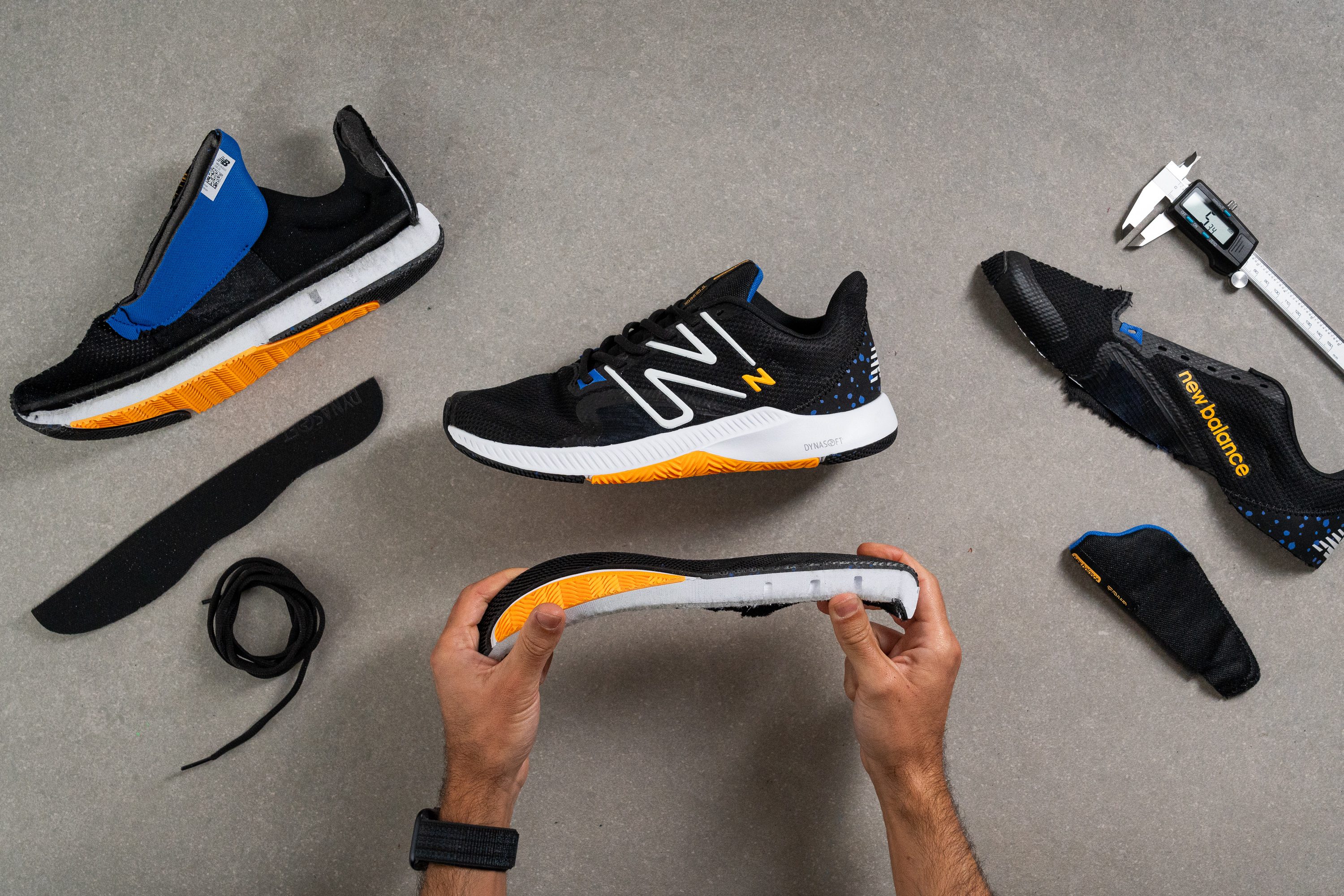
Cushioning
Heel stack
In training shoes, you want to remain in close contact with the ground and yet feel protected from the impact of jumps and other high-intensity movements.
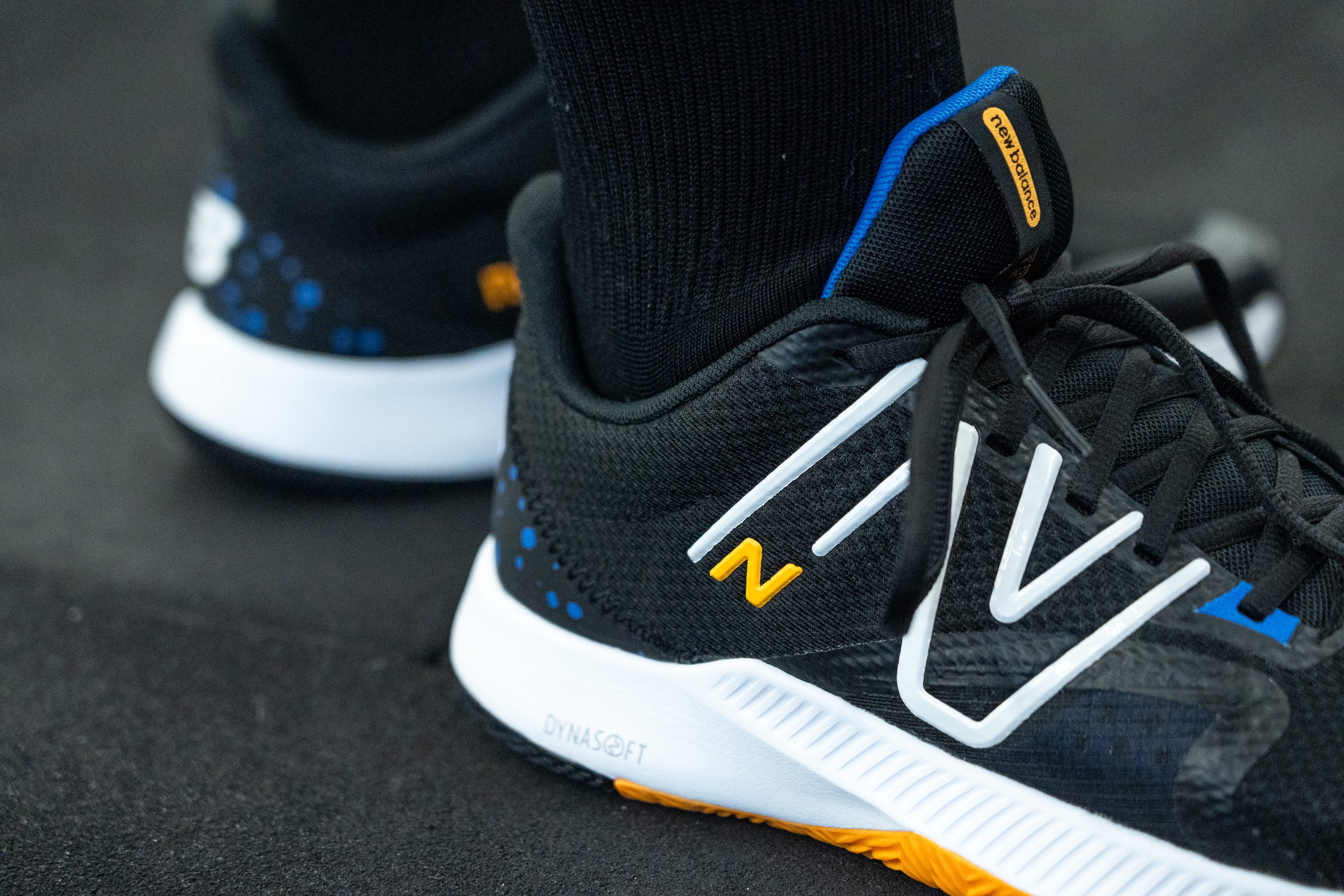
We found that the New Balance TRNR 2 handles that balance pretty well. Measuring its heel stack with a calliper, we got 26.9 mm.
It is a couple of millimetres taller than average but there was no compromise in the ground feel.
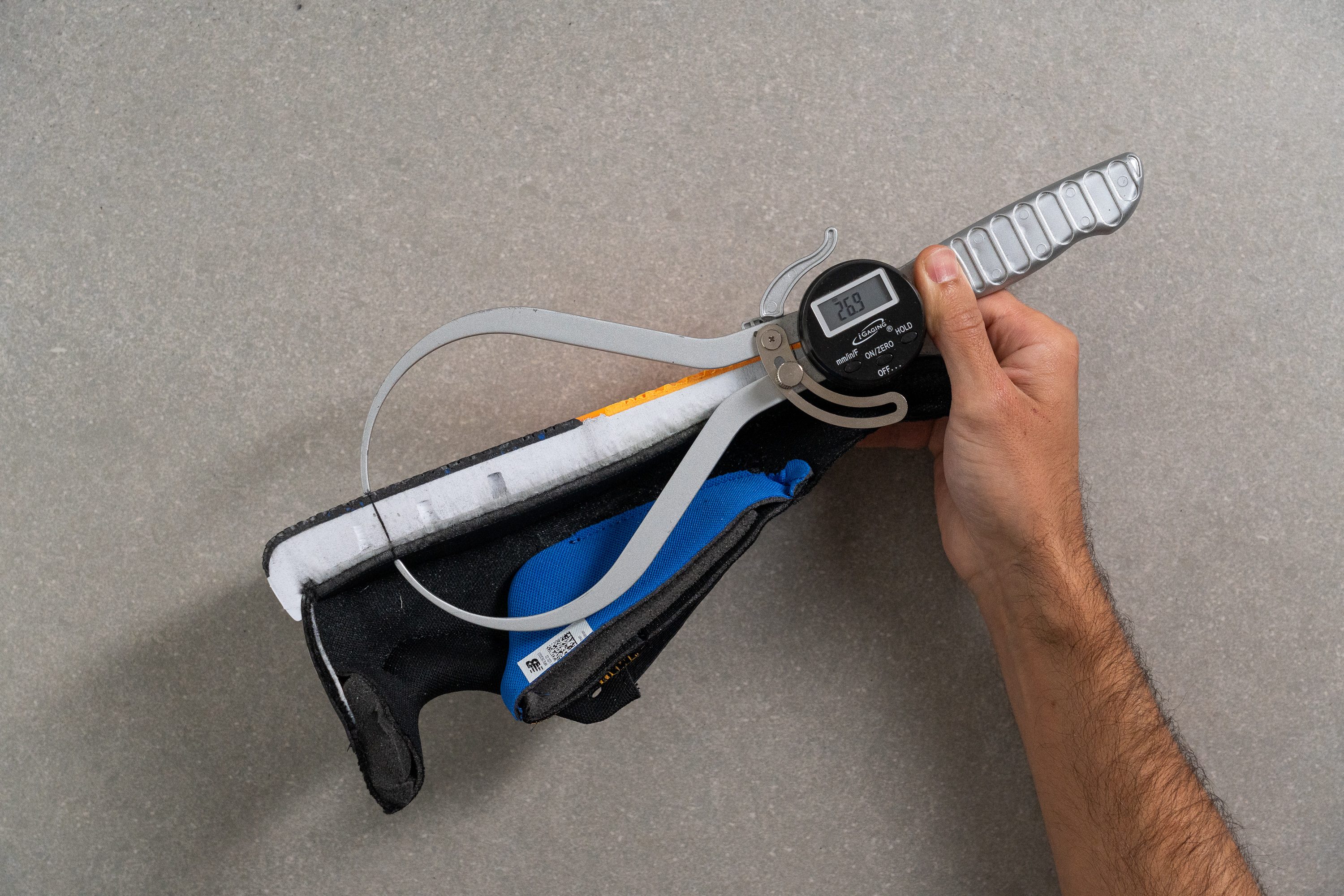
| DynaSoft TRNR v2 | 26.9 mm |
| Average | 24.3 mm |
Forefoot stack
In the forefoot part of the midsole, our calliper returned 20.7 mm of stack. Yet again, we found this amount of cushioning to be optimal for a wide range of gym activities.
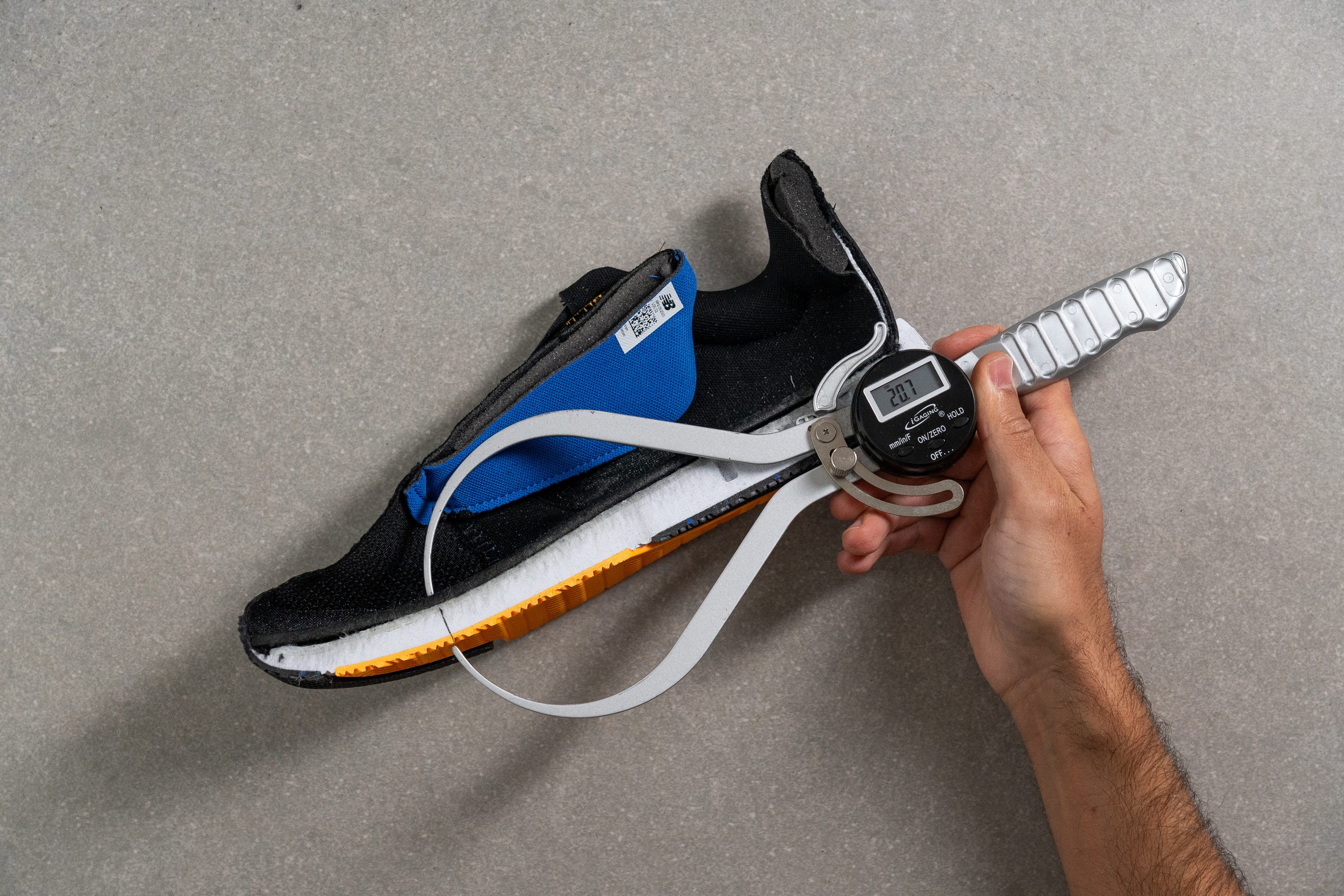
More specifically, we tested the DynaSoft TRNR 2 for rope jumping and experienced well-cushioned landings and responsive toe-offs.
| DynaSoft TRNR v2 | 20.7 mm |
| Average | 18.1 mm |
Drop
Cross-training shoes typically have a very minimal difference in height between the heels and toes. This parallel-to-the-ground position is the most optimal as it helps to achieve stability and balance with less effort.
In the DynaSoft TRNR 2, the drop comes in at 6.2 mm which is standard for a cross-trainer.
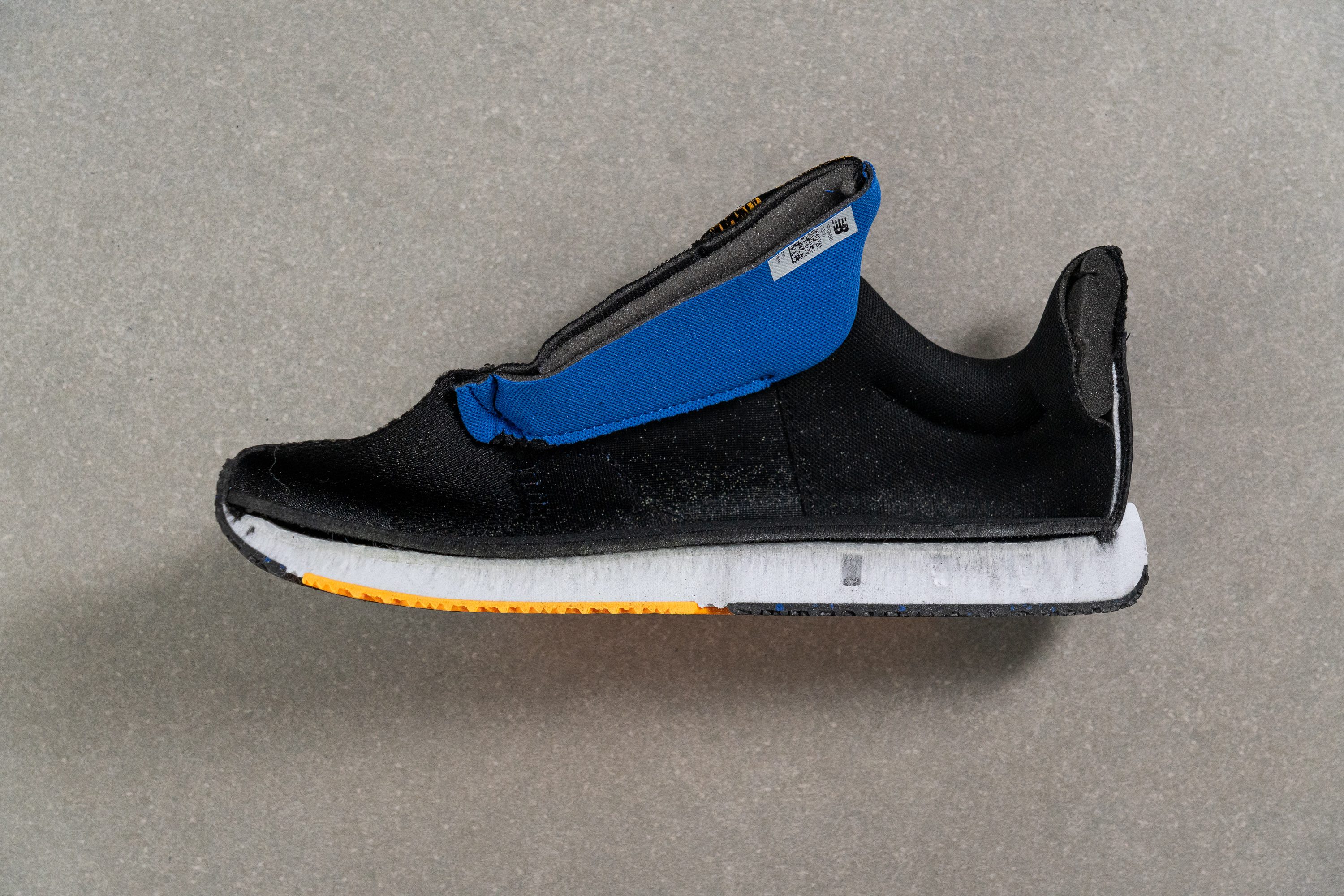
| DynaSoft TRNR v2 | 6.2 mm |
| Average | 6.3 mm |
Midsole softness
While the name of the foam "DynaSoft" is associated with really plush cushioning, we found it to be only moderately soft.
Pressing our durometer against the foam, we got a reading of 26.8 HA. This is nearly the same as the average of training shoes.
You don't want plush trainers for HIIT workouts and the like. This NB trainer has just a touch of softness that makes it quite responsive for jumps.
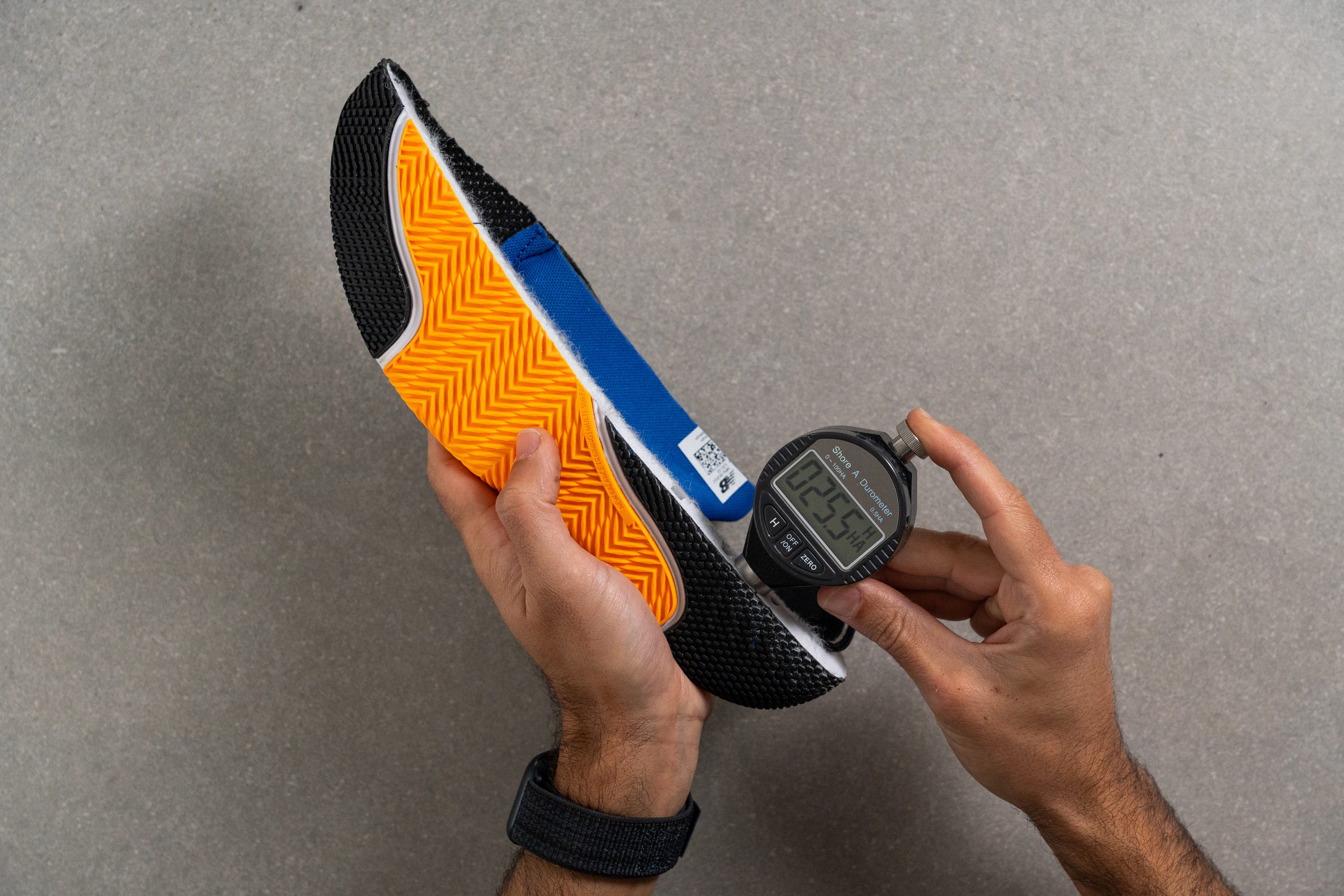
| DynaSoft TRNR v2 | 26.8 HA |
| Average | 27.8 HA |
Size and fit
Size
New Balance DynaSoft TRNR v2 fits true to size (24 votes).
Internal length
| DynaSoft TRNR v2 | 270.4 mm |
| Average | 268.9 mm |
Width / Fit
The New Balance DynaSoft TRNR 2 wrapped around our medium-width feet like a glove. It felt close-fitting but not in a snug way and we could feel some give in its toebox mesh.
For a more precise assessment, we retrieved a gel mould of the shoe's interiors.
As expected, our calliper showed a standard reading of 96.0 mm in the widest area of the mould (near the ball of the foot).
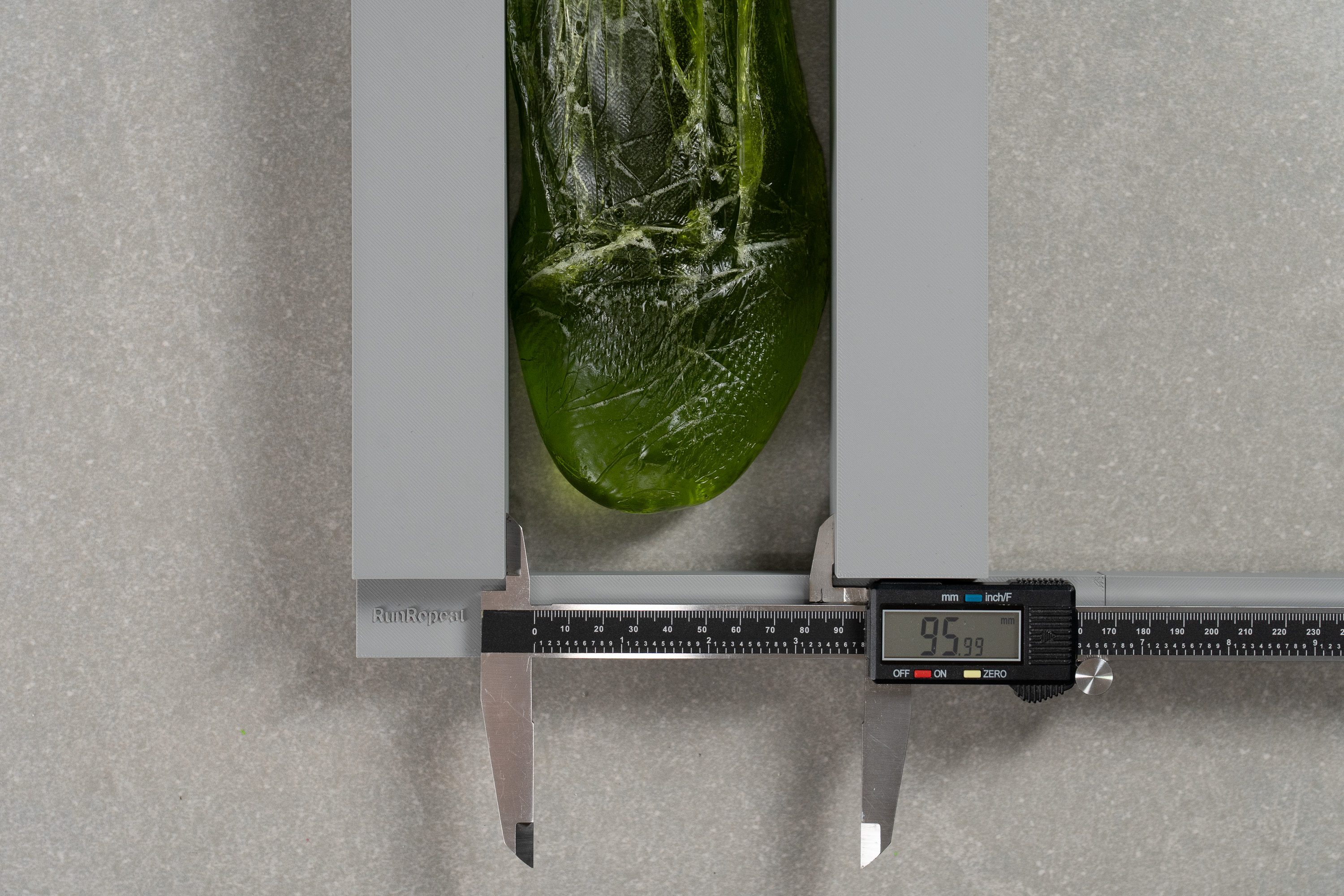
| DynaSoft TRNR v2 | 96.0 mm |
| Average | 96.6 mm |
Toebox width
Cramped toes were never a concern in this NB trainer as there was very little tapering in the TRNR 2's toebox.
Measuring its width near the big toe, our calliper showed 73.5 mm which is exactly the same as the average of training shoes.
However, if have wide feet or you don't feel like yourself without ample toe space, this New Balance trainer is also available in wide and extra wide.
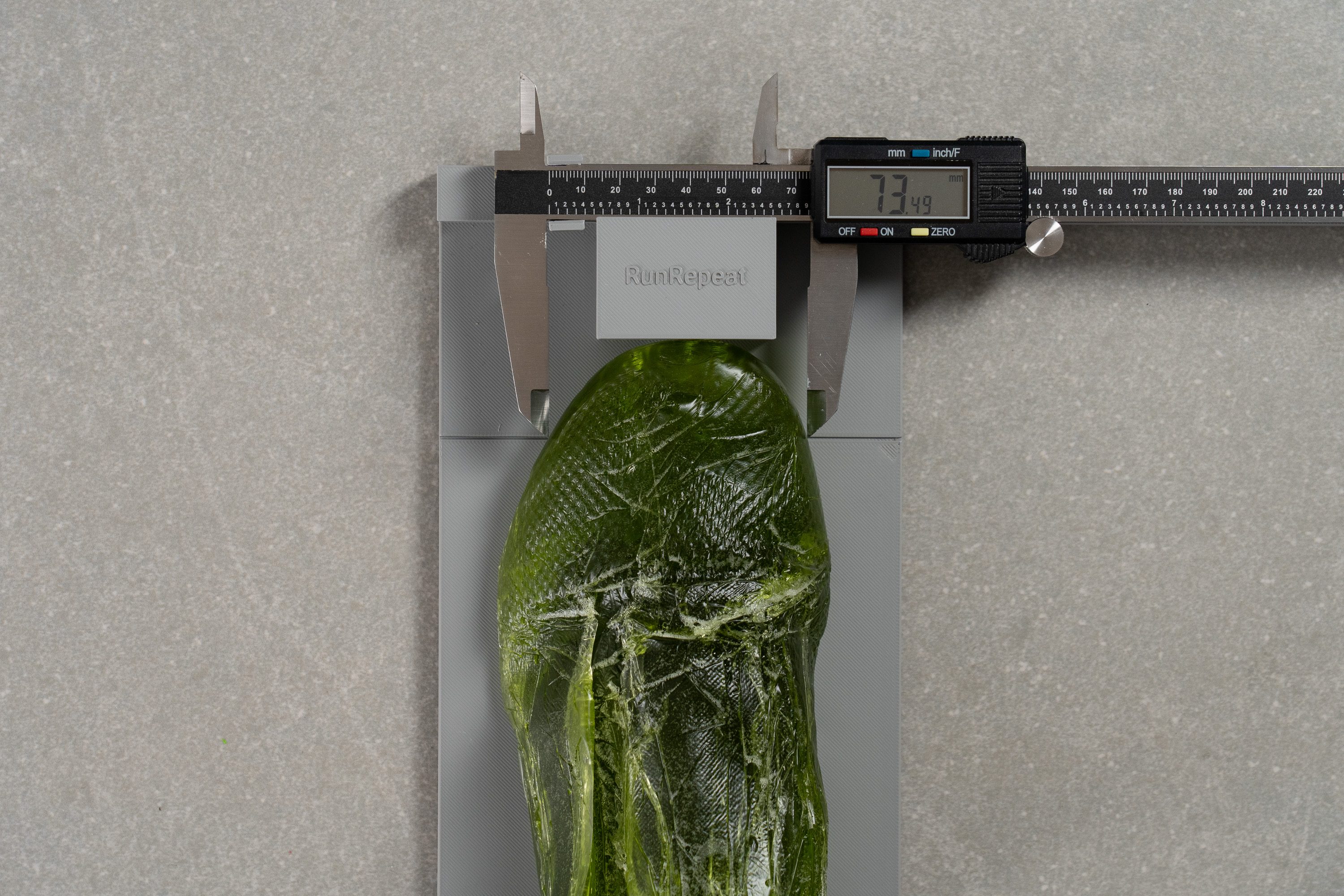
| DynaSoft TRNR v2 | 73.5 mm |
| Average | 73.5 mm |
Toebox height
However, the TRNR v2 might feel close-fitting because of the lower-than-average toebox height. We recorded 25.0 mm in this area.
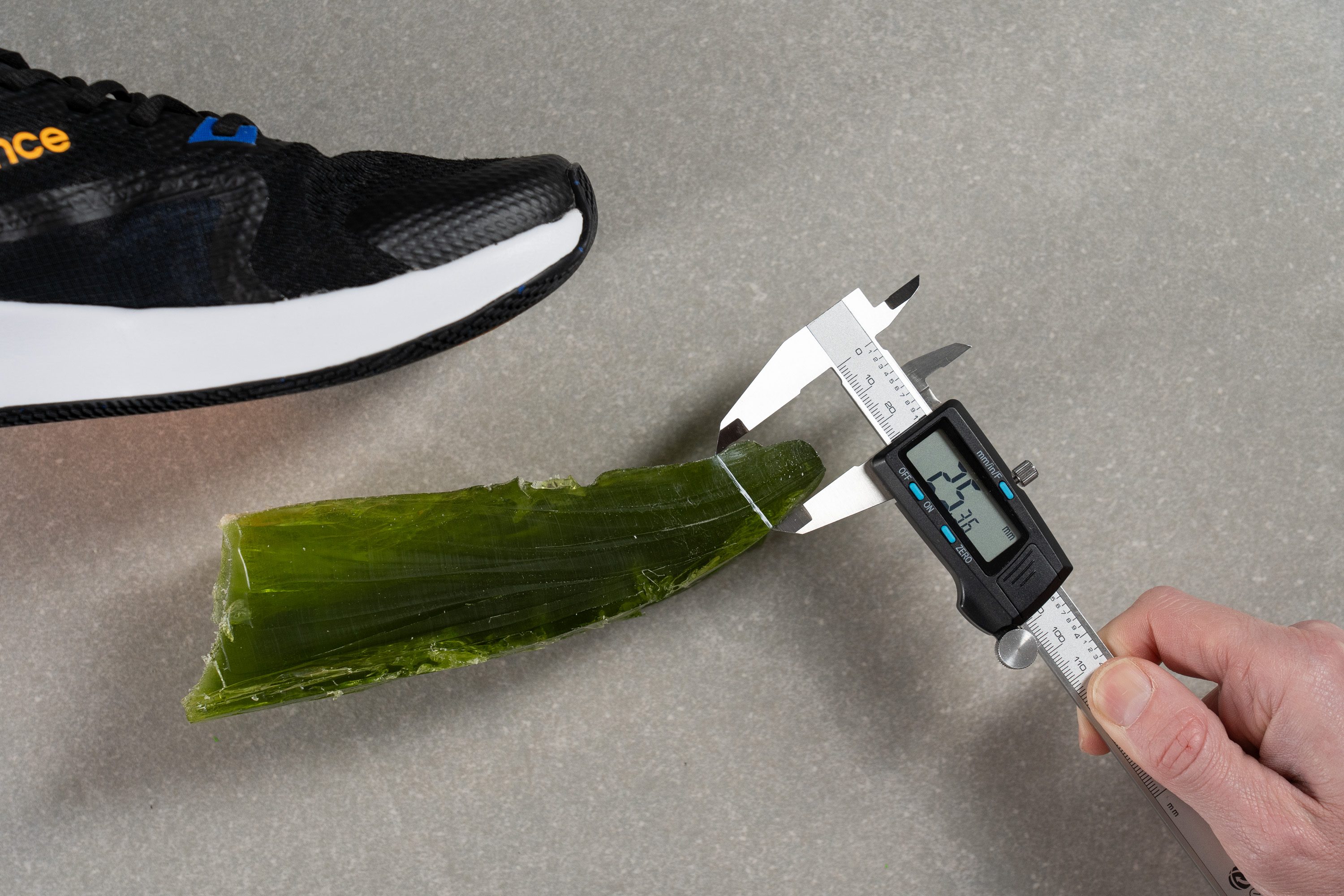
| DynaSoft TRNR v2 | 25.0 mm |
| Average | 27.1 mm |
Flexibility / Stiffness
Given this New Balance shoe's simple design, there is nothing to hold back its flexibility.
Walking, jumping, holding planks, and doing burpees, our feet felt as much freedom of movement as they needed to bend.
To check the trainer's flexibility in our lab, we bent it to a 90-degree angle and measured how much effort it takes with a force gauge. With a measurement of 16.6N, we found that the TRNR 2 is indeed 20% more flexible than average!
This test follows an older methodology, which is why you don't see recently tested shoes in the chart. Results from different methodologies can not be compared.
| DynaSoft TRNR v2 | 16.6N |
| Average | 17.7N |
Weight
The moment we slipped into the NB TRNR 2, we knew it was lighter than many other cross-trainers on the market.
Weighing the trainer in a men's US size 9, we got 10.2 oz (289g) on our scale. This is an ounce lighter than the average and is also a bit lighter than the popular Nike Free Metcon 5 (10.5 oz/298g).
The TRNR 2 felt exceptionally agile on foot and made exercises like high knee runs much more bearable.
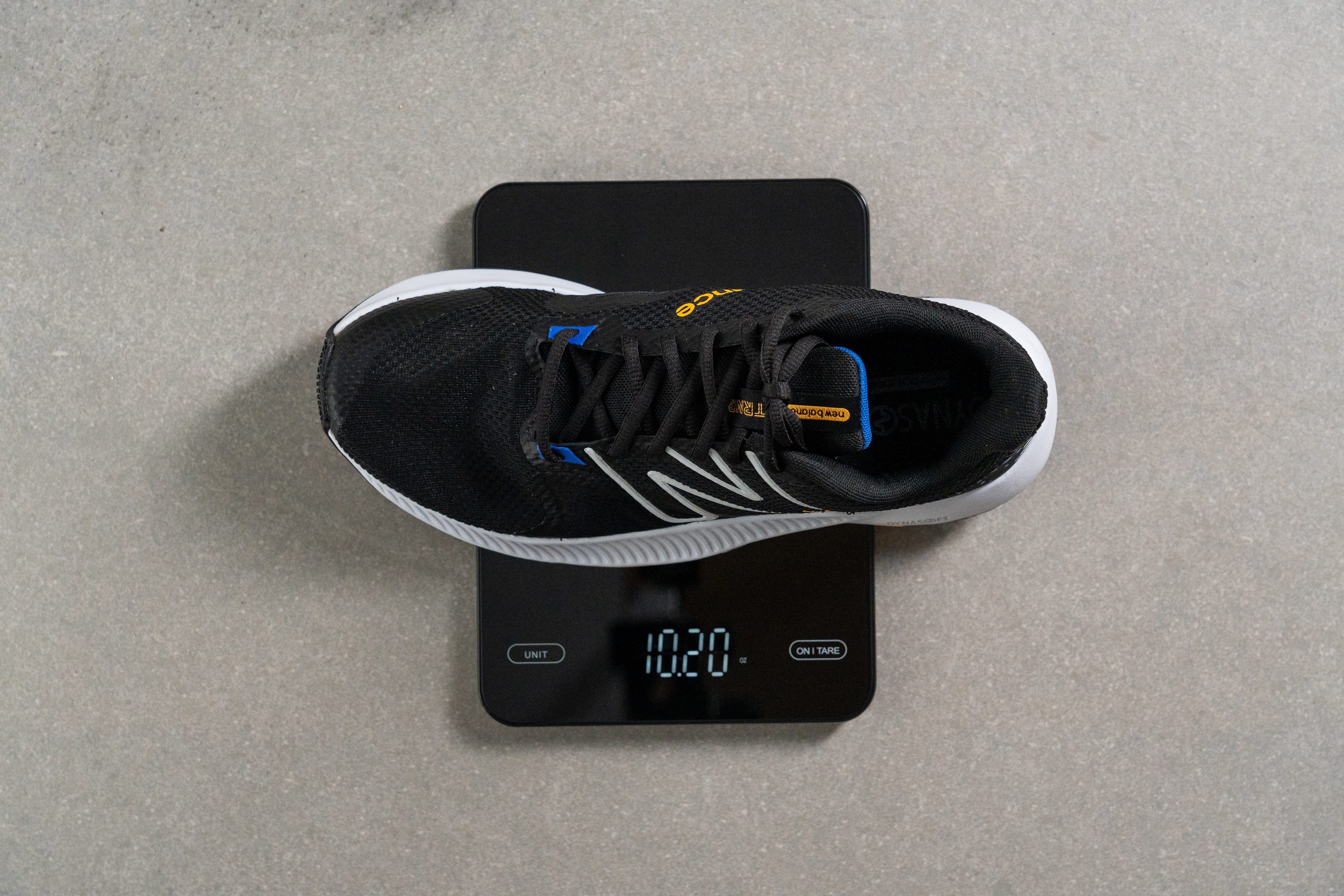
| DynaSoft TRNR v2 | 10.2 oz (289g) |
| Average | 10.7 oz (304g) |
Breathability
New Balance puts a special emphasis on the TRNR 2's breathable mesh upper in its product description. And we are happy to confirm that it lives up to the claims!
Putting the TRNR 2 through our smoke-pumping machine test, we saw a substantial amount of smoke passing through the shoe's upper. Specifically in the toebox mesh!
On our breathability scale from 1 to 5, where 5 is the airiest, this NB trainer earned a solid 4 out of 5. And if you crave 5/5 ventilation, we can recommend the Adidas Dropset Trainer 2.
No wonder the TRNR gets to be so breathable! Look at all those large ventilation pores on its toebox and throughout the upper!
Using a microscope, we also investigated the shoe's mesh upper up close.
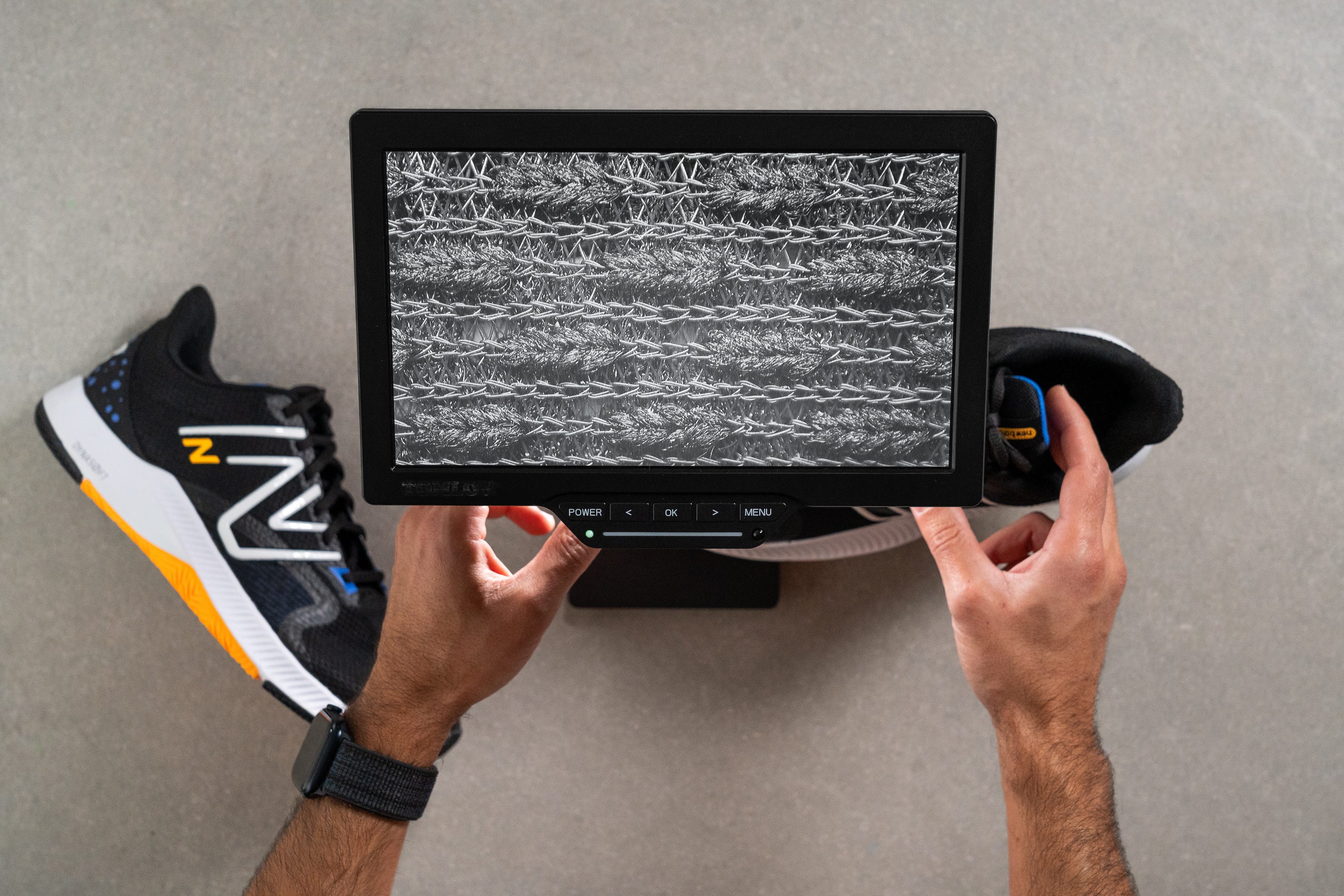
Turns out, this New Balance trainer uses a mix of different threads that are closely woven together and yet leave pretty large pores for breathability.
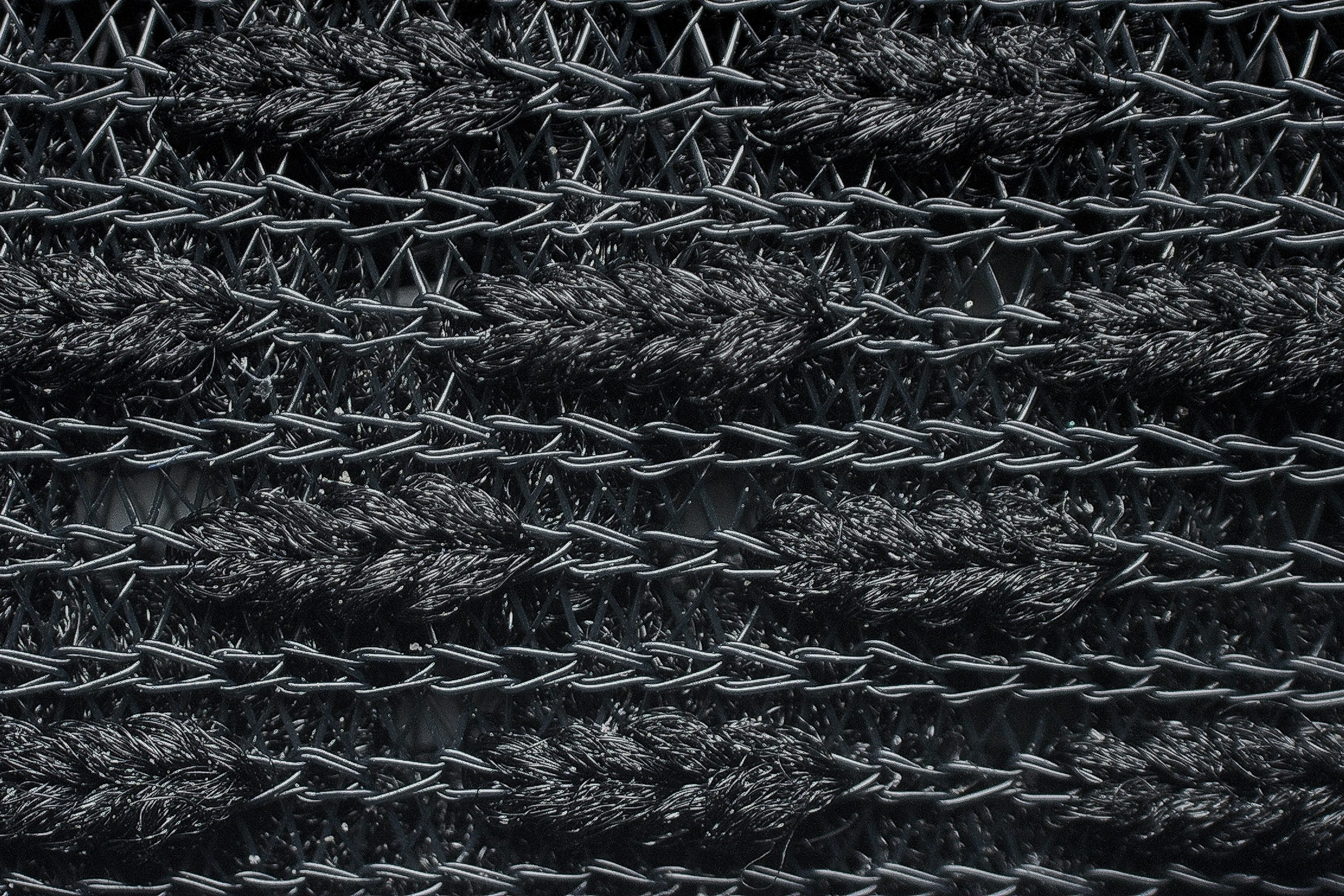
| DynaSoft TRNR v2 | 4 |
| Average | 3.6 |
Stability
Lateral stability test
The NB TRNR 2 has a very basic training shoe construction. Unlike the famous Nike Metcon, it doesn't feature any bells and whistles for enhanced stability.
And yet, for what it's worth, we found the DynaSoft TRNR 2 to be a sufficiently steady trainer.
But if you're wondering exactly how stable flagship cross-trainers are, here is what lateral stability looks like in the Nike Metcon 8.
Torsional rigidity
The DynaSoft TRNR 2 may look like a "softie" but it surely has some rigidity in its character.
Assessing the shoe's torsional stiffness in our manual test, we found that it resists being twisted. On a 1-5 scale, where 5 is the stiffest, we rated it with a pretty high score of 4.
Pair that with the shoe's slightly raised foam walls on the sides, and you will get a minimised risk of ankle rolls!
| DynaSoft TRNR v2 | 4 |
| Average | 2.9 |
Heel counter stiffness
Having a reasonably stiff heel counter is another essential component of stability and foothold. But you don't want it to be too rigid either as it could limit ankle mobility and freedom of movement overall.
We found that the TRNR 2 hits a sweet sport here with a moderately stiff heel counter. We rated it with an average score of 3 out of 5.
| DynaSoft TRNR v2 | 3 |
| Average | 2.7 |
Midsole width - forefoot
This New Balance trainer is equipped with a nice wide platform to prevent wobbly feet and impromptu foot rolling.
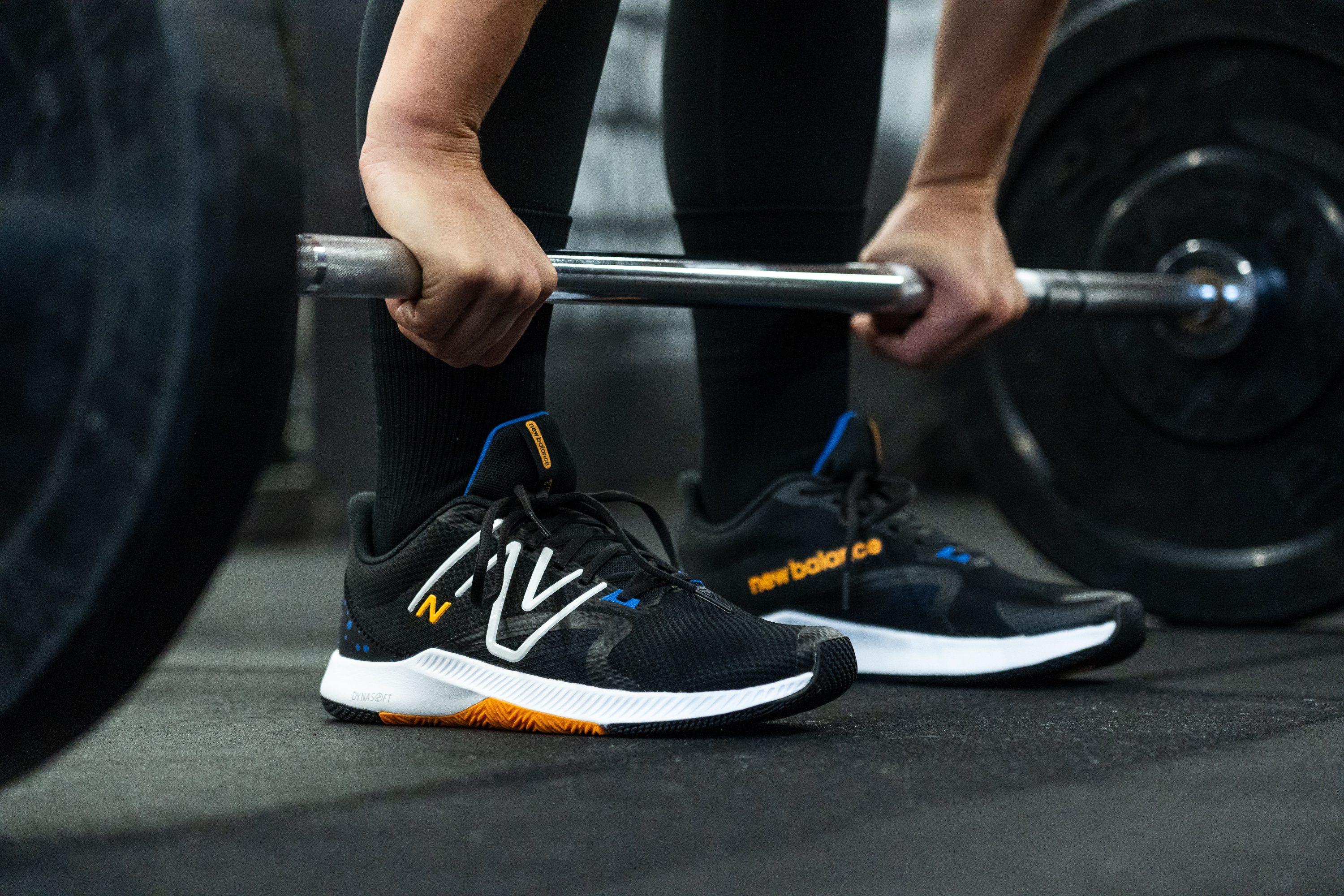
Measuring the shoe's midsole in the widest part of the forefoot, we got 117.3 mm. This is notably wider than the average and is very similar to the Nike Metcon 9 parameters.
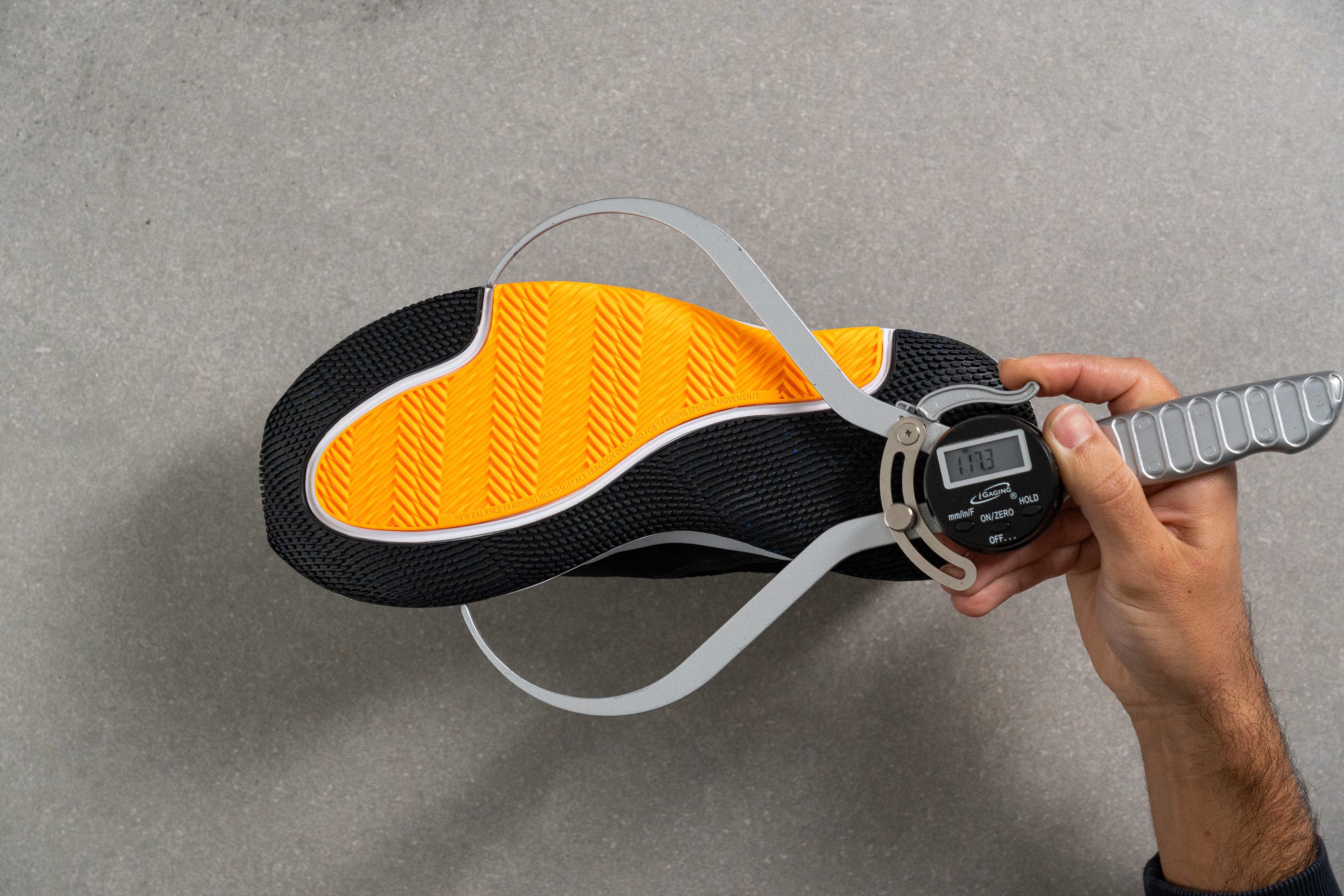
| DynaSoft TRNR v2 | 117.3 mm |
| Average | 110.9 mm |
Midsole width - heel
In the widest part of the heel, we also got an above-average width of 91.6 mm. Quite surprising for a basic under-£100 trainer!
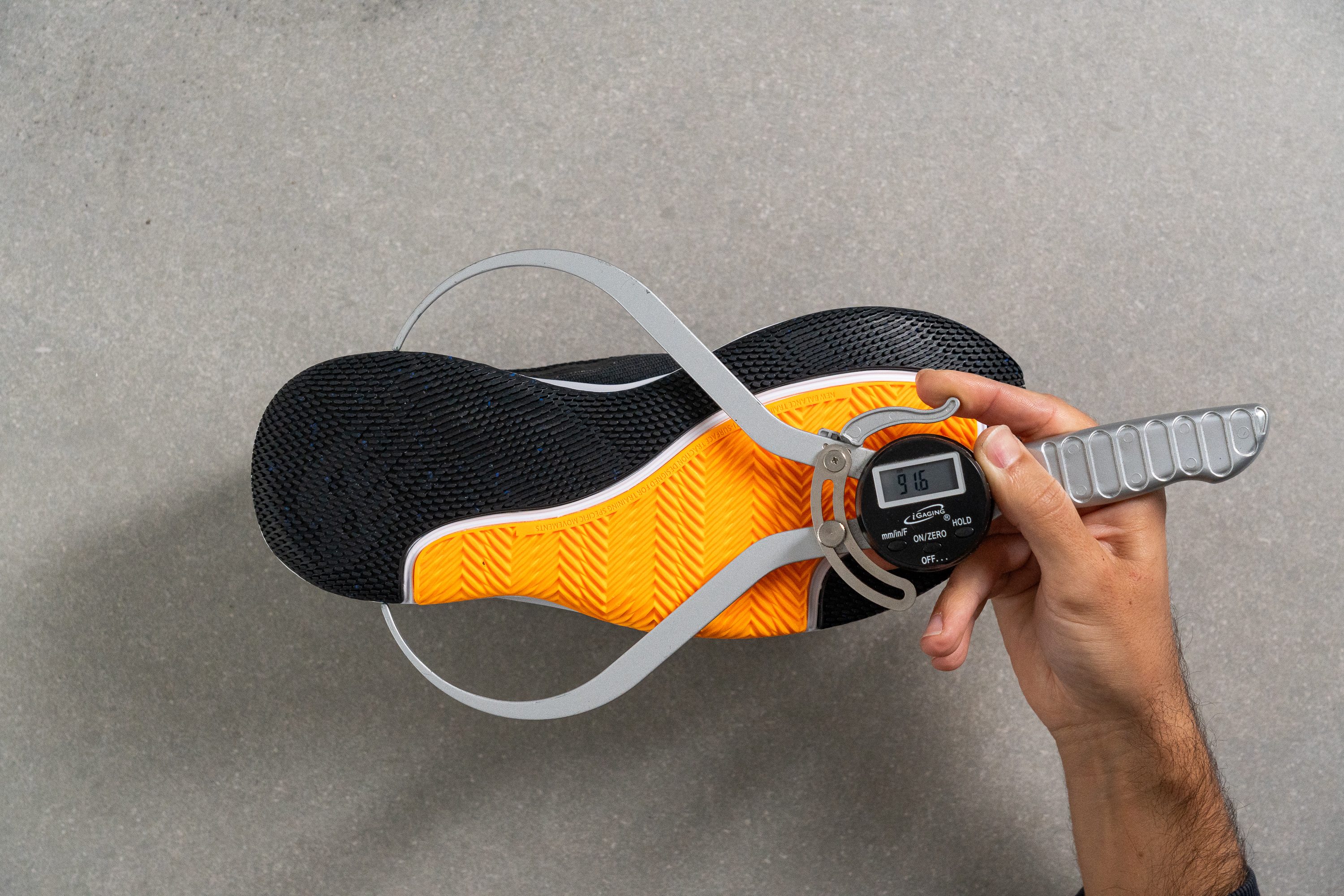
| DynaSoft TRNR v2 | 91.6 mm |
| Average | 86.9 mm |
Durability
Toebox durability
But to our great disappointment, the shoe's breathability comes at the price of durability. Its upper material is just too dainty to resist an abrasive force, like our Dremel for example.
It took the tool just a few seconds to leave a large hole in the shoe's mesh toebox.
For that reason, we cannot rate its toebox durability any higher than 1 on a 1-5 scale.
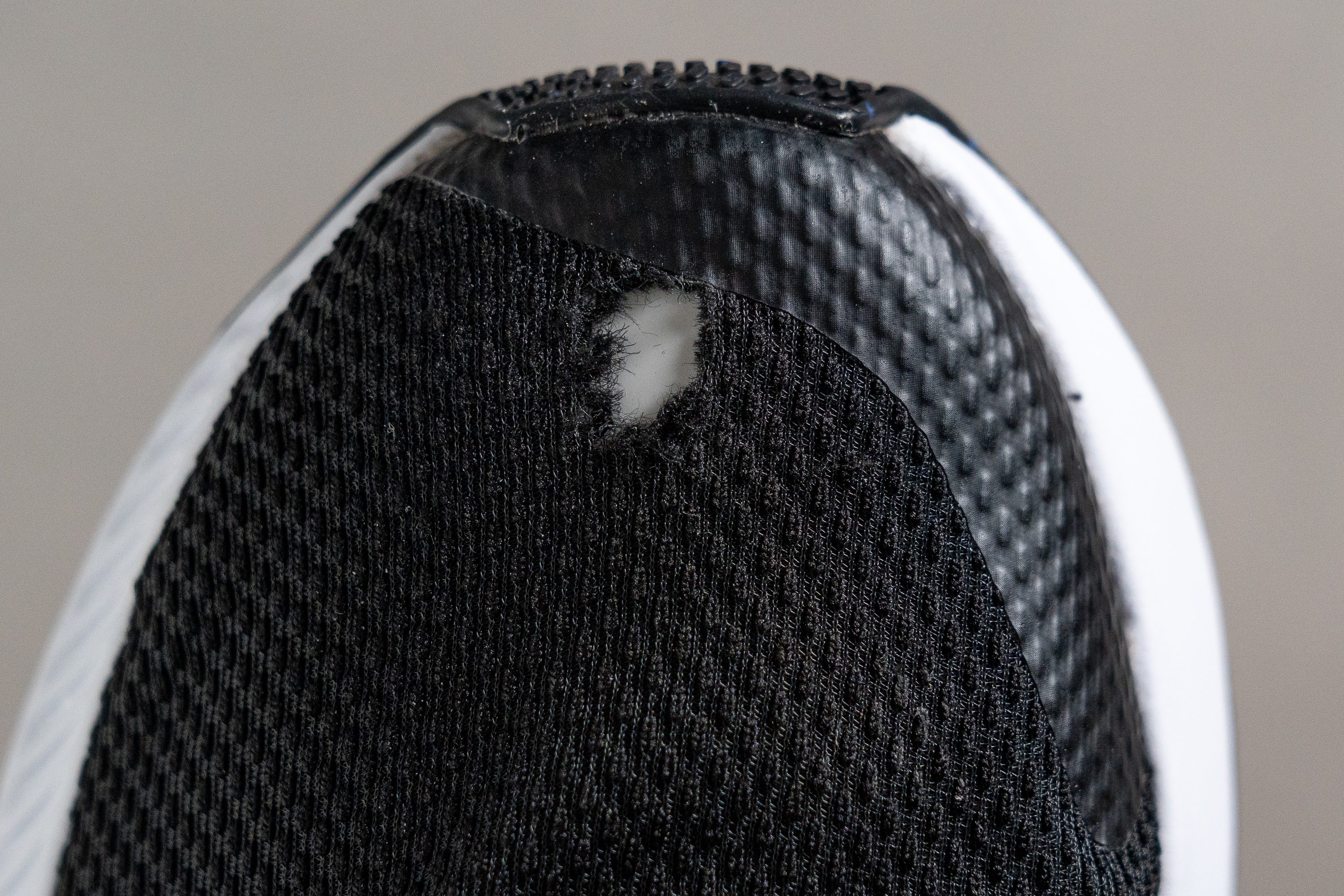
For the record, we apply the exact same speed (5K RPM) and pressure (3.2N) to all of our tested training shoes. And some shoes actually stand up to the test, like the Under Armour TriBase Reign 5 for example (4 out of 5).
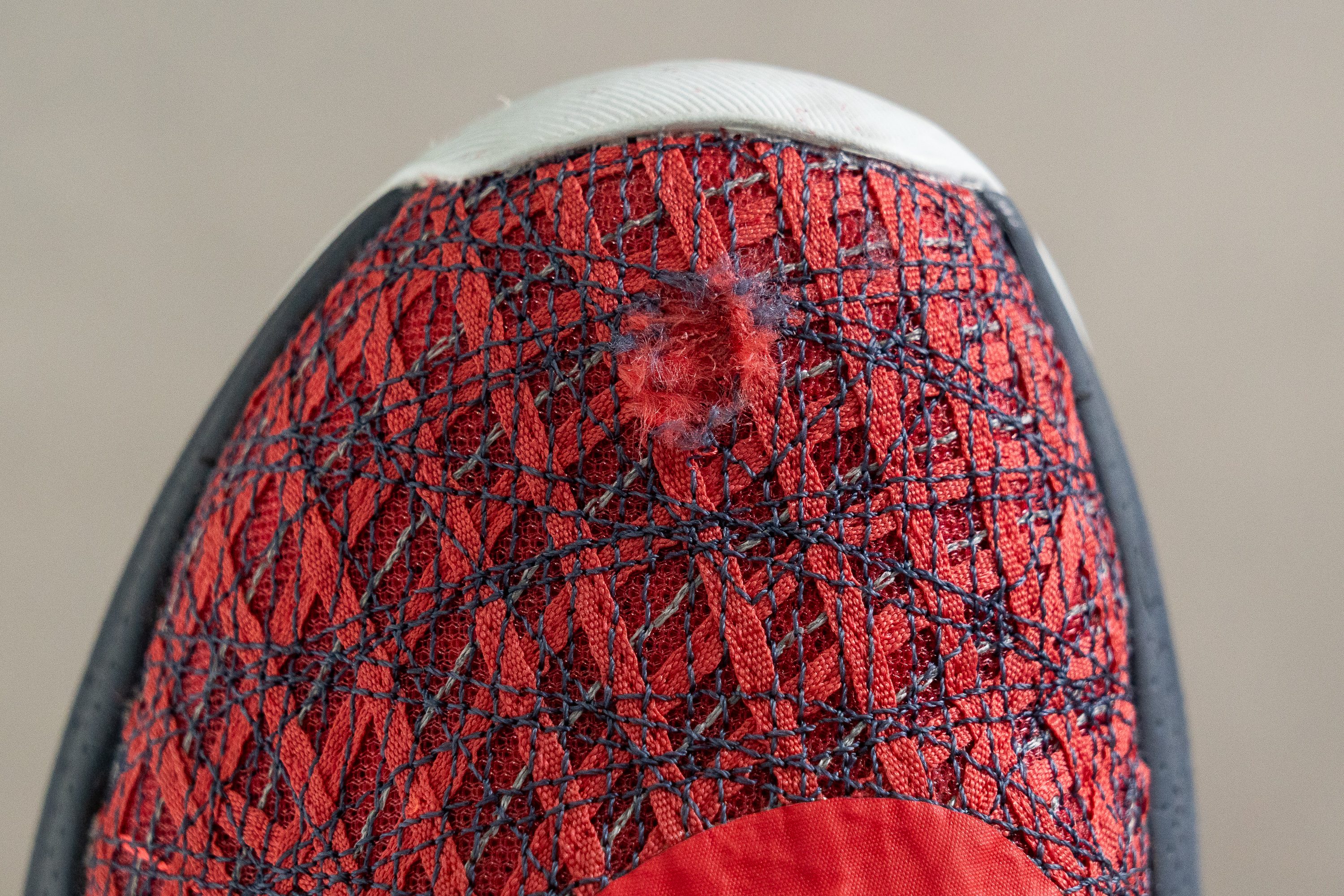
| DynaSoft TRNR v2 | 1 |
| Average | 2.7 |
Heel padding durability
Much like the shoe's upper mesh, its inner lining didn't show much abrasion resistance.
Drilling it for only 4 seconds resulted in damage that was serious enough to lower the heel padding durability score to the minimum 1 out of 5.
We believe that such textile quality is way too frail, even for an £80 shoe.
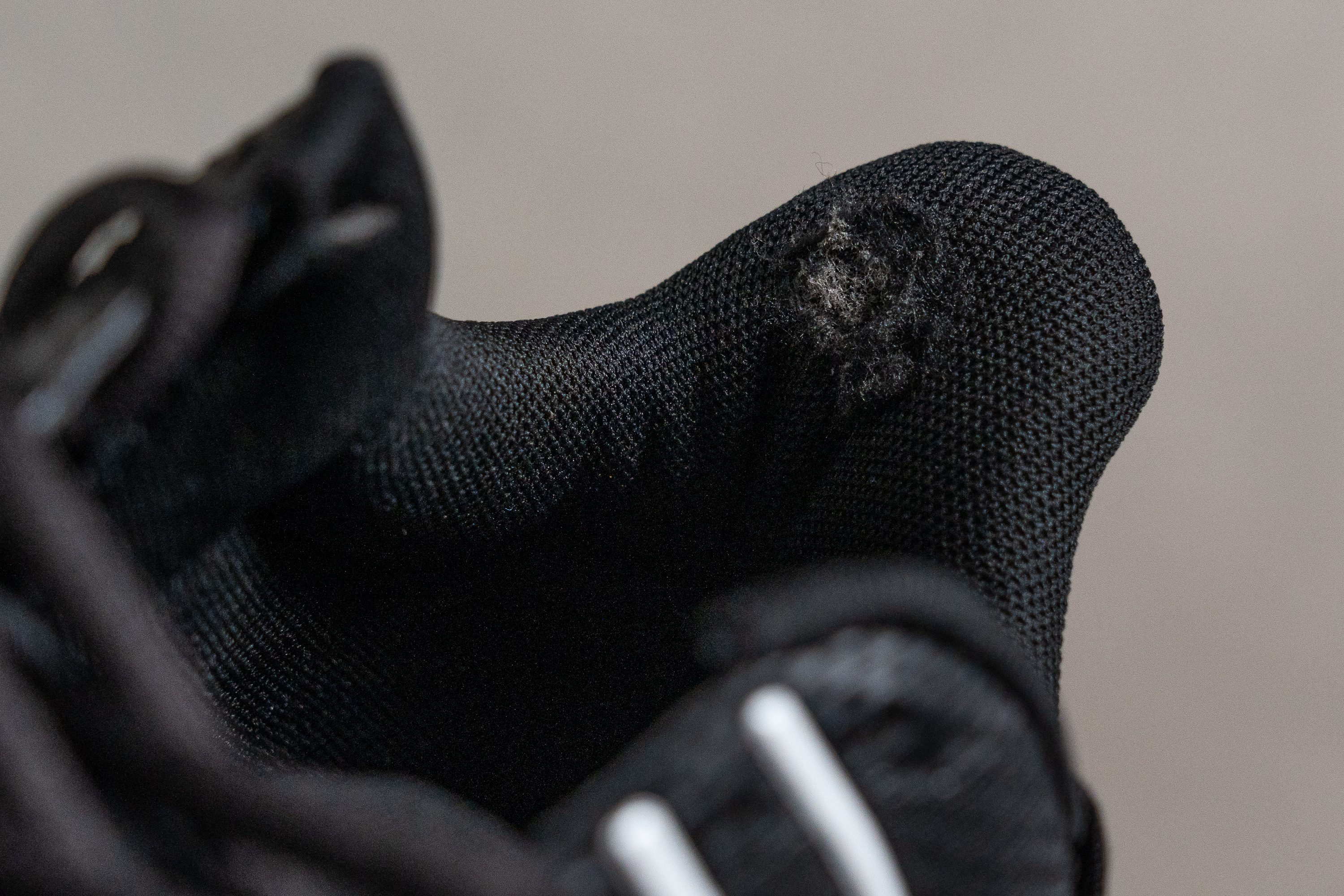
| DynaSoft TRNR v2 | 1 |
| Average | 2.9 |
Outsole hardness
Given how frail the shoe's upper textile is, we were more conscious about its outsole.
Measuring rubber hardness with a durometer, we got a pretty low reading of 72.5 HC. This is 17% softer than average! Oops, is this shoe's outsole going to be torn apart too?
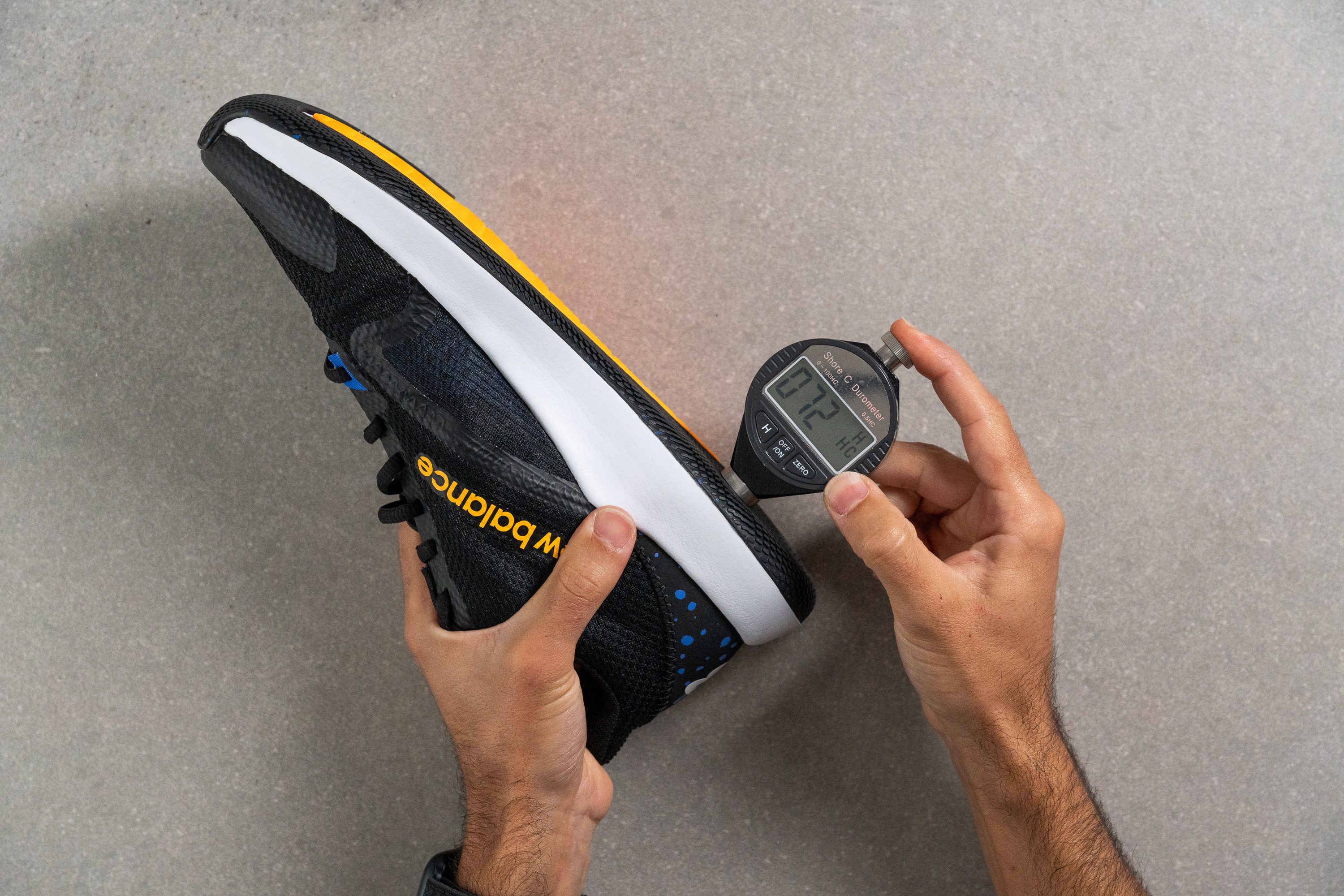
| DynaSoft TRNR v2 | 72.5 HC |
| Average | 83.2 HC |
Outsole durability
As it turns out, no! Despite the correlation between rubber hardness and its durability, this New Balance trainer proves otherwise.
After 22 seconds of drilling it at a fierce speed of 10K RPM, the dent was even smaller than average!
According to our tread gauge, the dent is only 0.79 mm deep which is smaller than the typical 1 mm. Looks like walking on concrete won't destroy the shoe's outsole so fast.
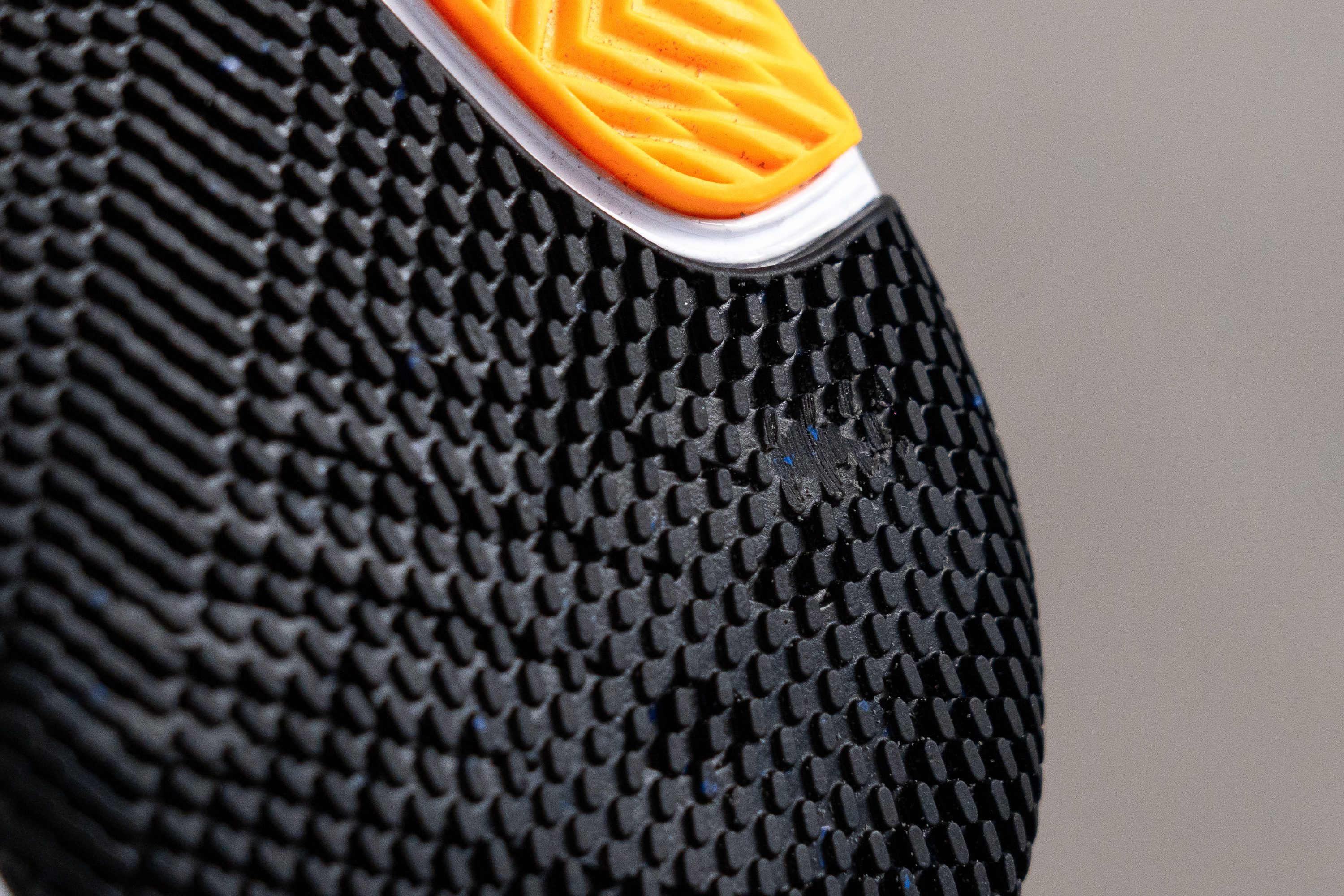
| DynaSoft TRNR v2 | 0.8 mm |
| Average | 1.1 mm |
Outsole thickness
After measuring the shoe's outsole at a pretty thick 4.3 mm, we felt even more reassured.
Looks like the New Balance Dynasoft TRNR 2 can indeed be worn outside the gym. We found the shoe's outsole reinforced enough to handle pavements. However, you must be careful not to scratch the upper as it tears way too easily.
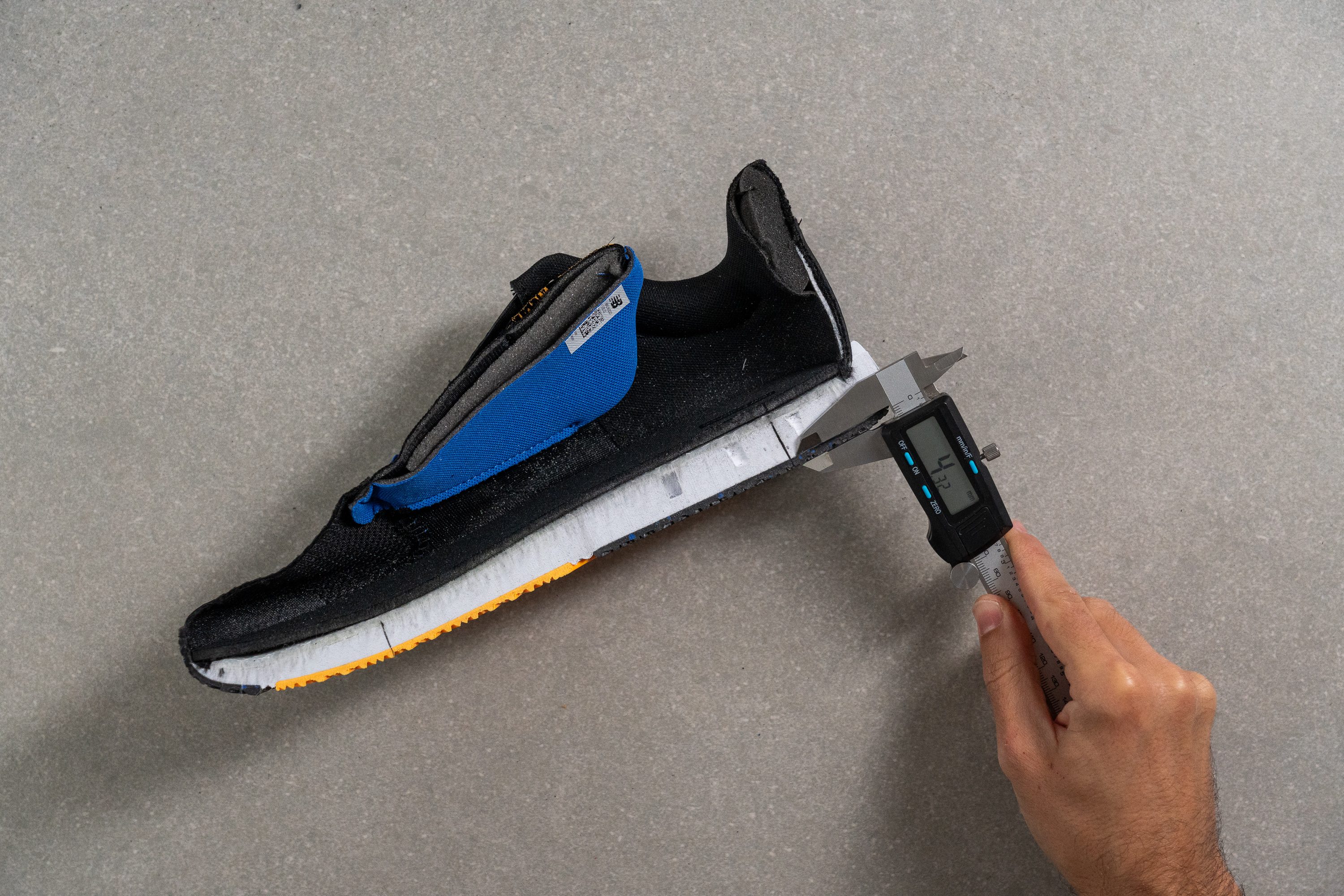
| DynaSoft TRNR v2 | 4.3 mm |
| Average | 3.6 mm |
Misc
Insole thickness
We always include insole thickness in our stack measurements. The insole in the New Balance TRNR 2 turned out to be quite average at 3.9 mm.
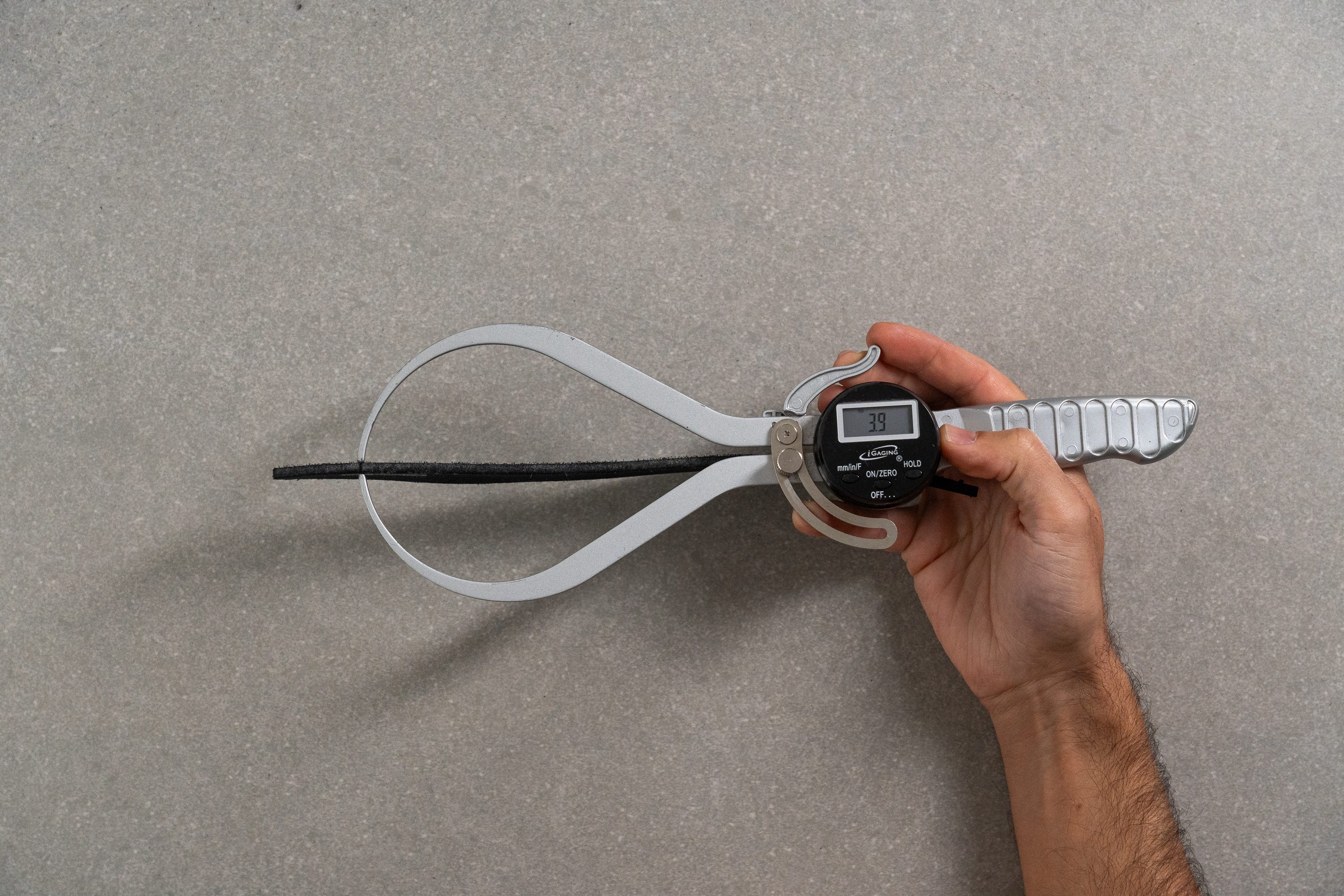
| DynaSoft TRNR v2 | 3.9 mm |
| Average | 4.0 mm |
Removable insole
The stock insole is easy to take out of the New Balance TRNR 2 in case you need to use custom orthotics.
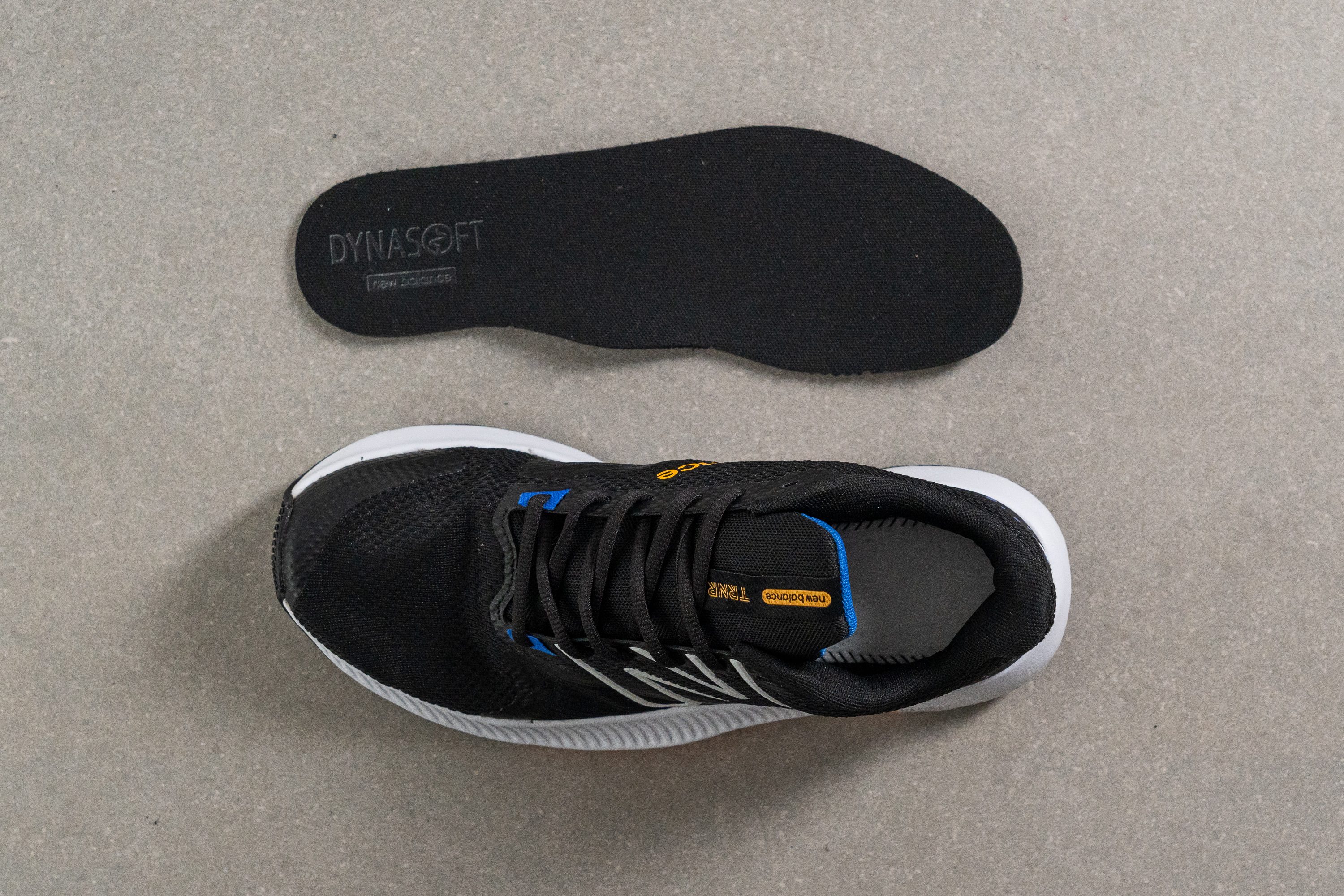
| DynaSoft TRNR v2 | Yes |
Tongue padding
This New Balance shoe didn't skimp on padding around the collar and in the tongue. Our calliper showed a generous 8.3 mm of foamy comfort in the latter.
No wonder the brand recommends it for all-day wear!
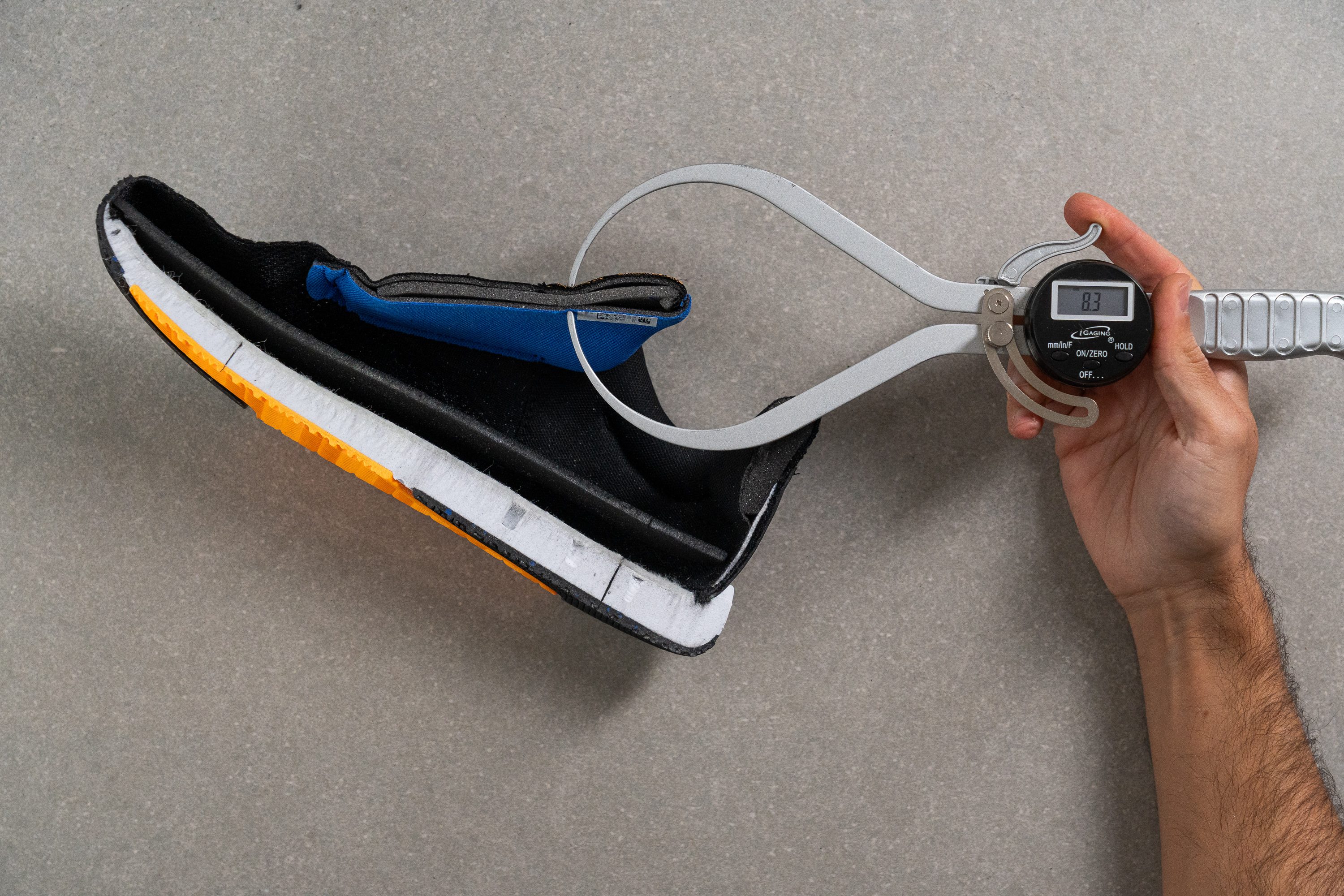
| DynaSoft TRNR v2 | 8.3 mm |
| Average | 5.7 mm |
Tongue: gusset type
The shoe's tongue has no attachments on the sides which may result in slight tongue shifting. But this wasn't a glaring issue for us and took a seconds to fix.
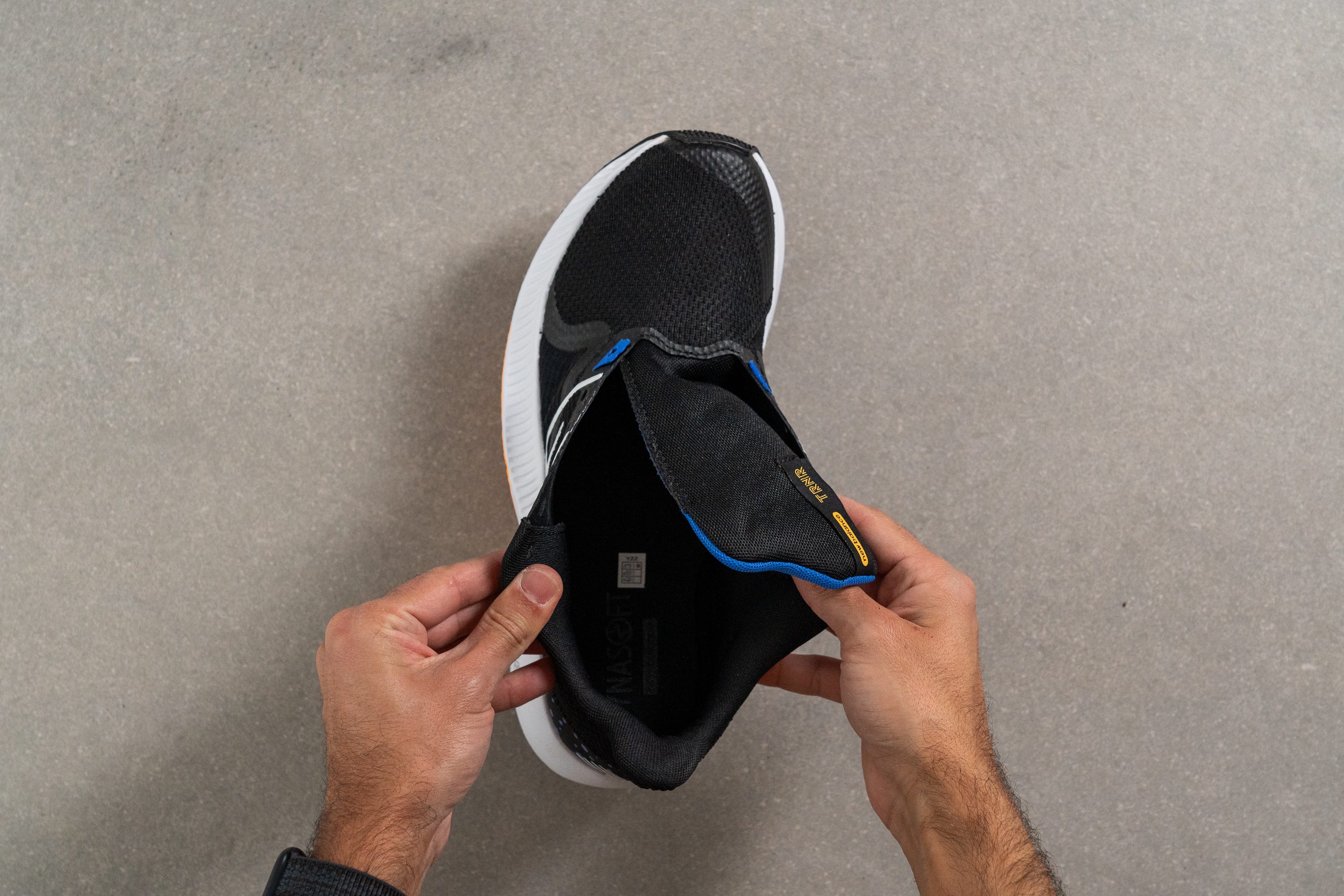
| DynaSoft TRNR v2 | None |
Heel tab
No finger loops or pull tabs are present in the TRNR 2. But you can grab the shoe's extended heel collar lip to help yourself get in.
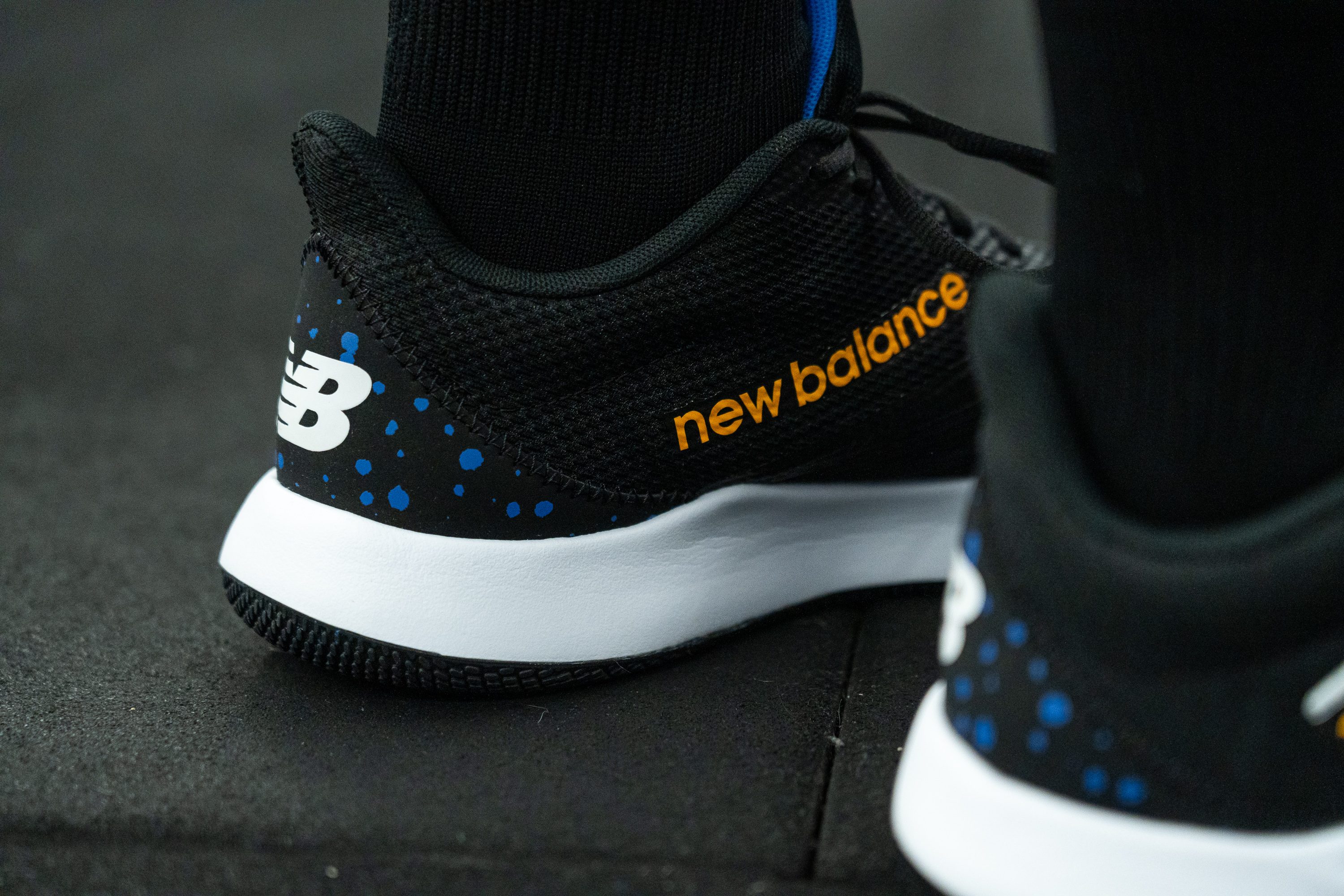
| DynaSoft TRNR v2 | None |
